Away from Home Virtual Exhibition
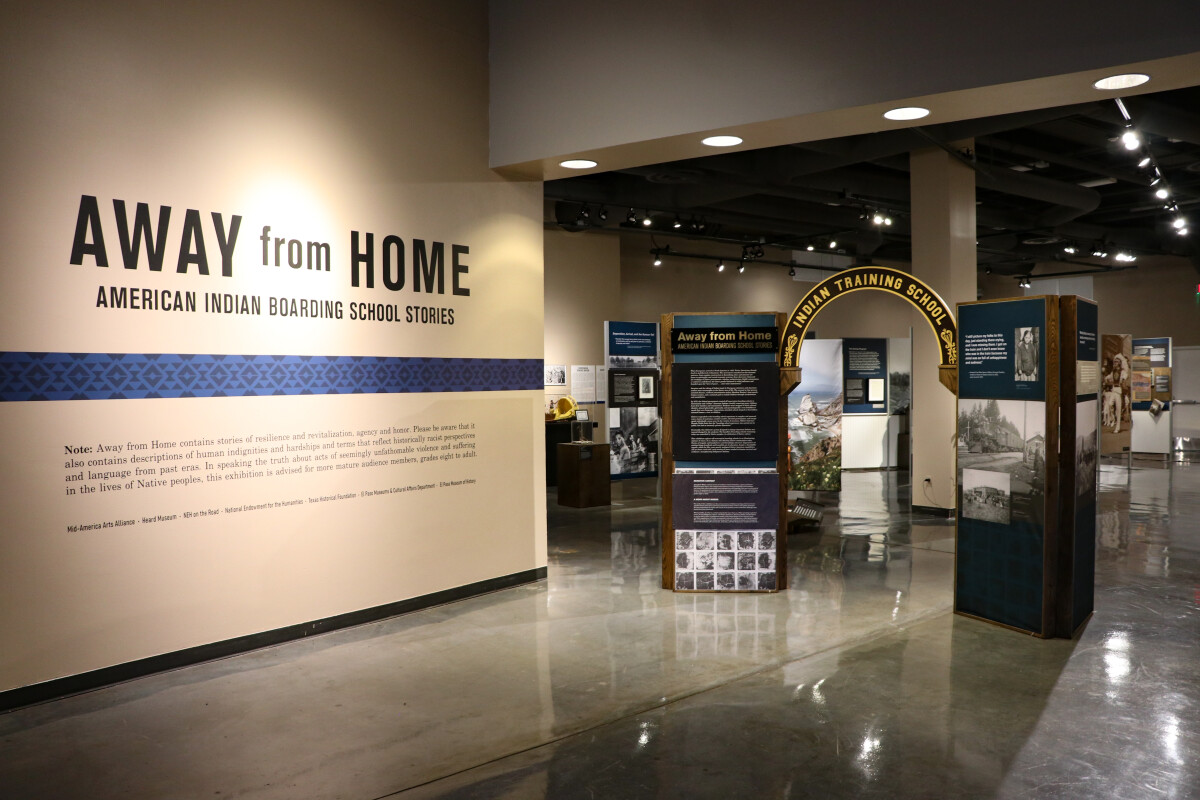
Away from Home Virtual Exhibition
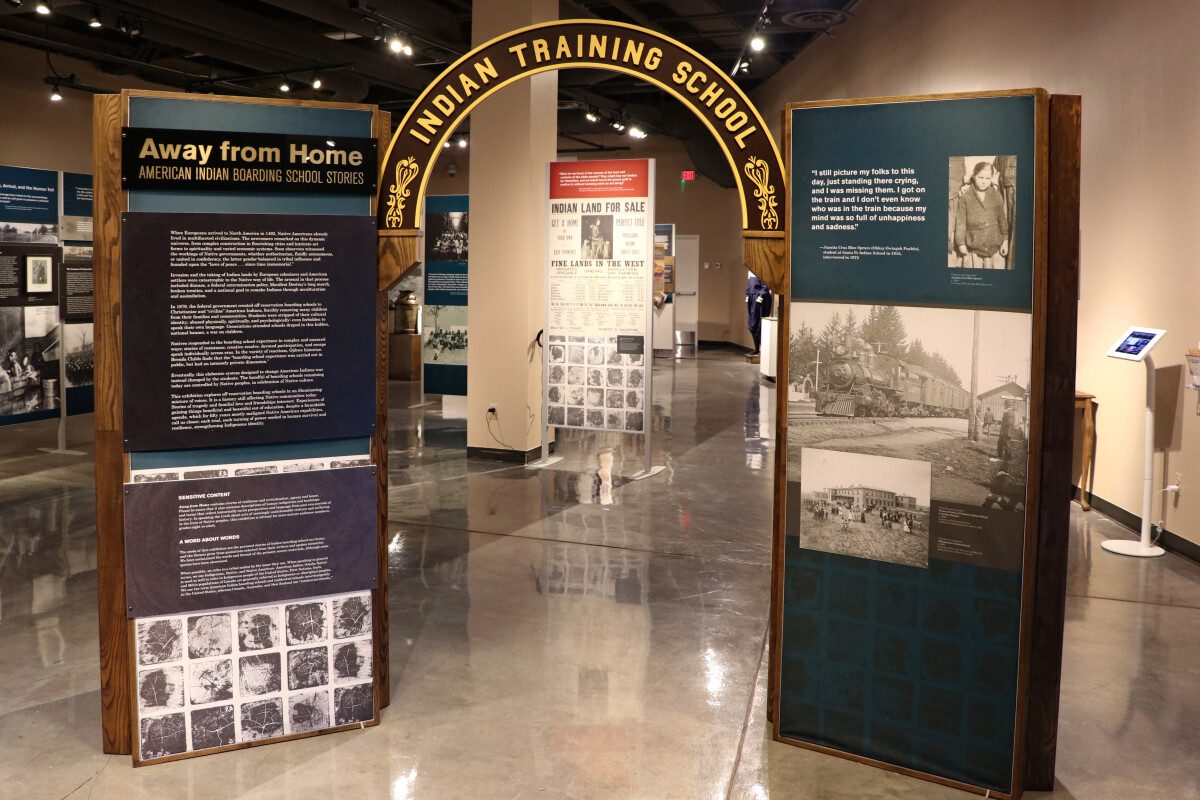
Away from Home Virtual Exhibition
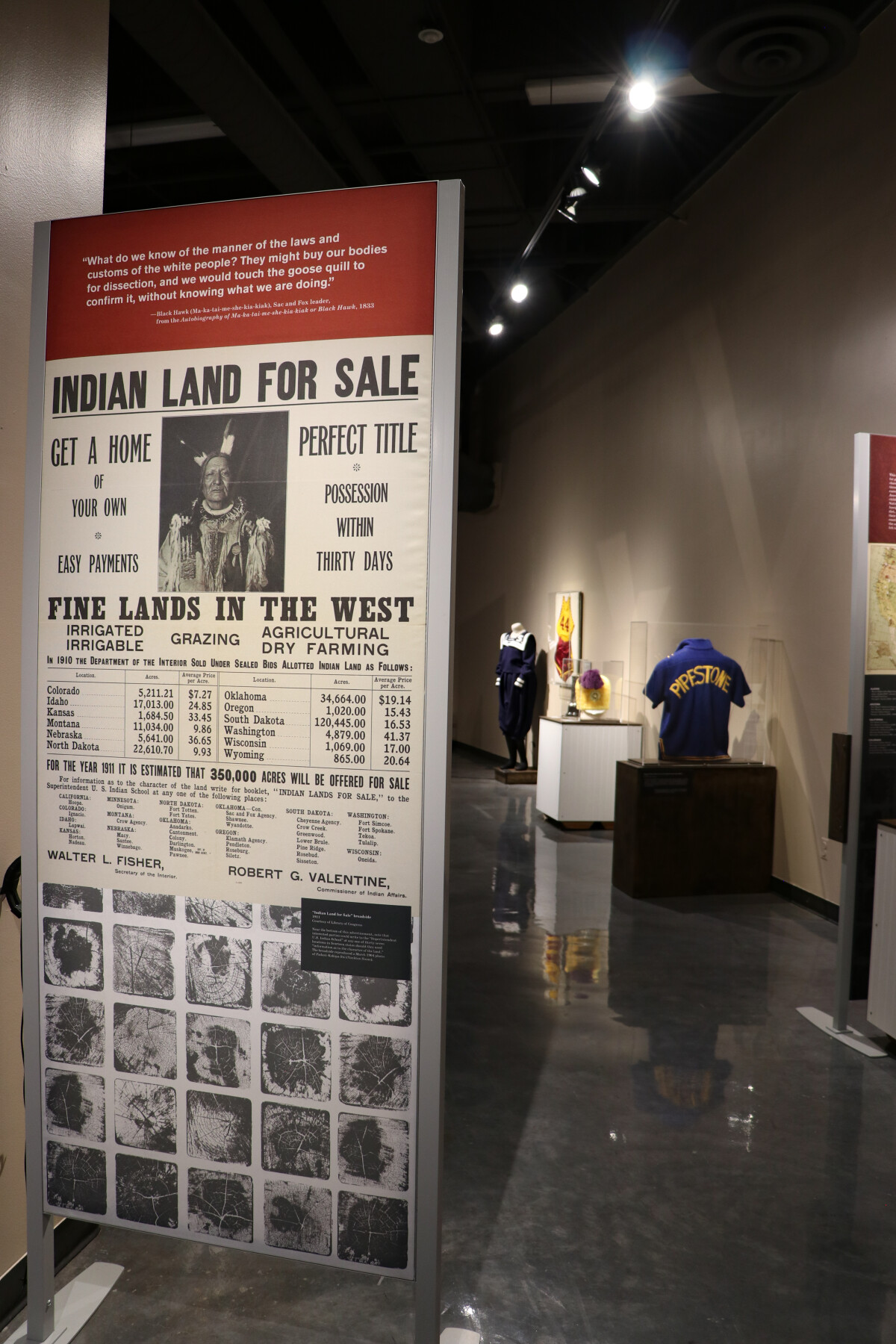
Away from Home Virtual Exhibition
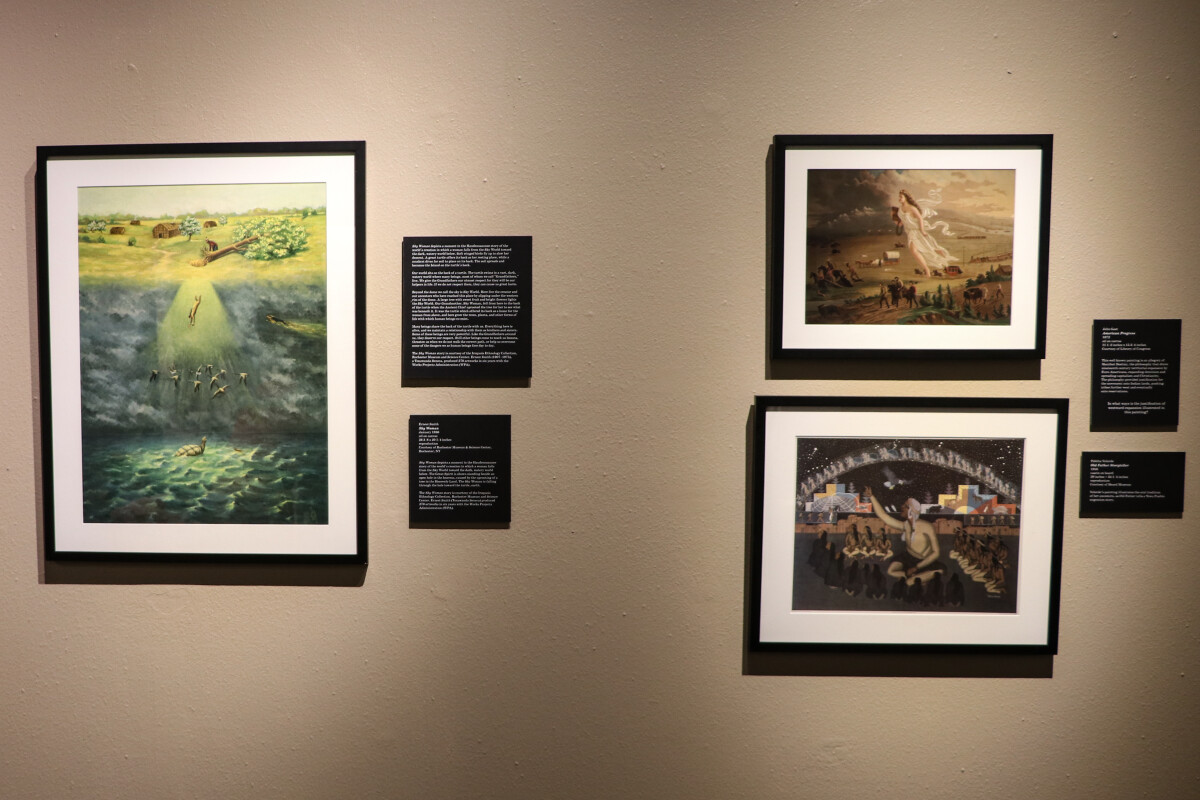
Away from Home Virtual Exhibition
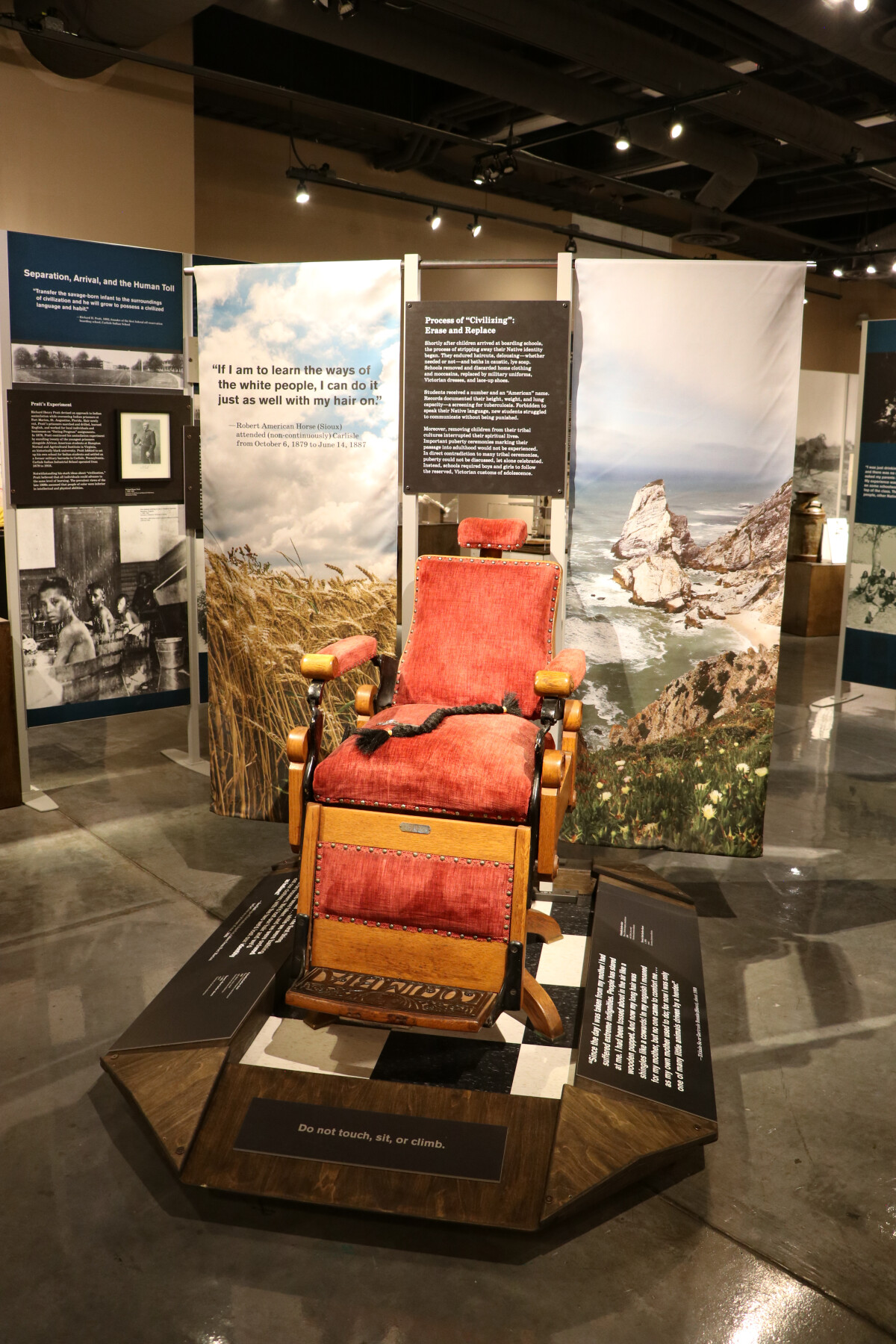
Away from Home Virtual Exhibition
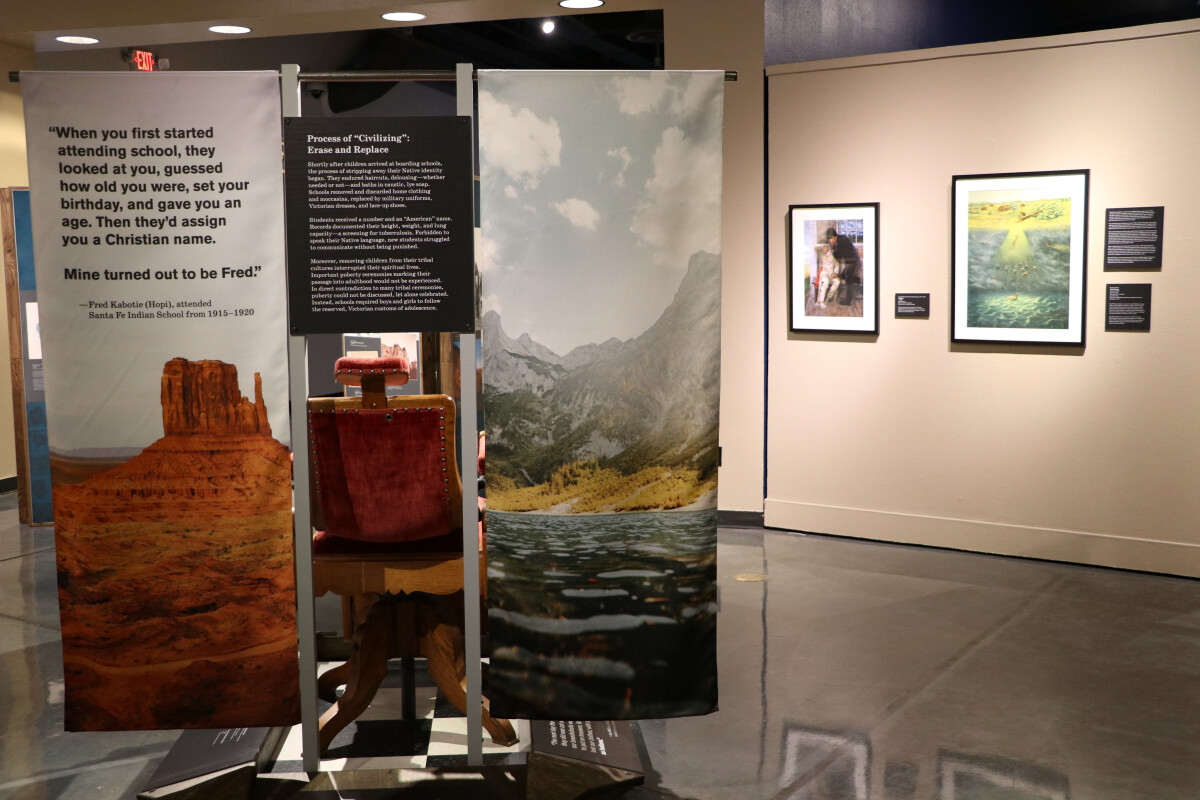
Away from Home Virtual Exhibition
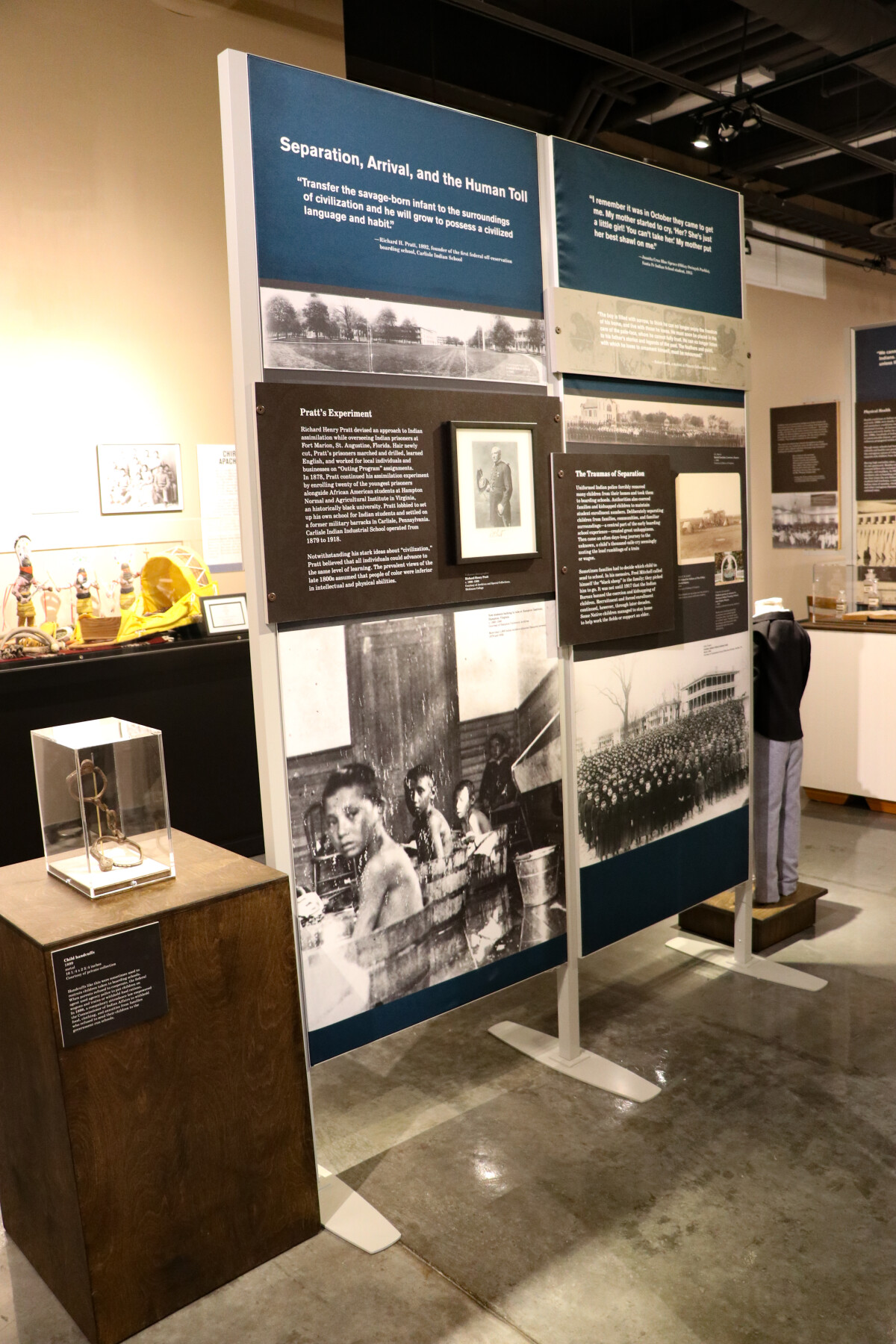
Away from Home Virtual Exhibition
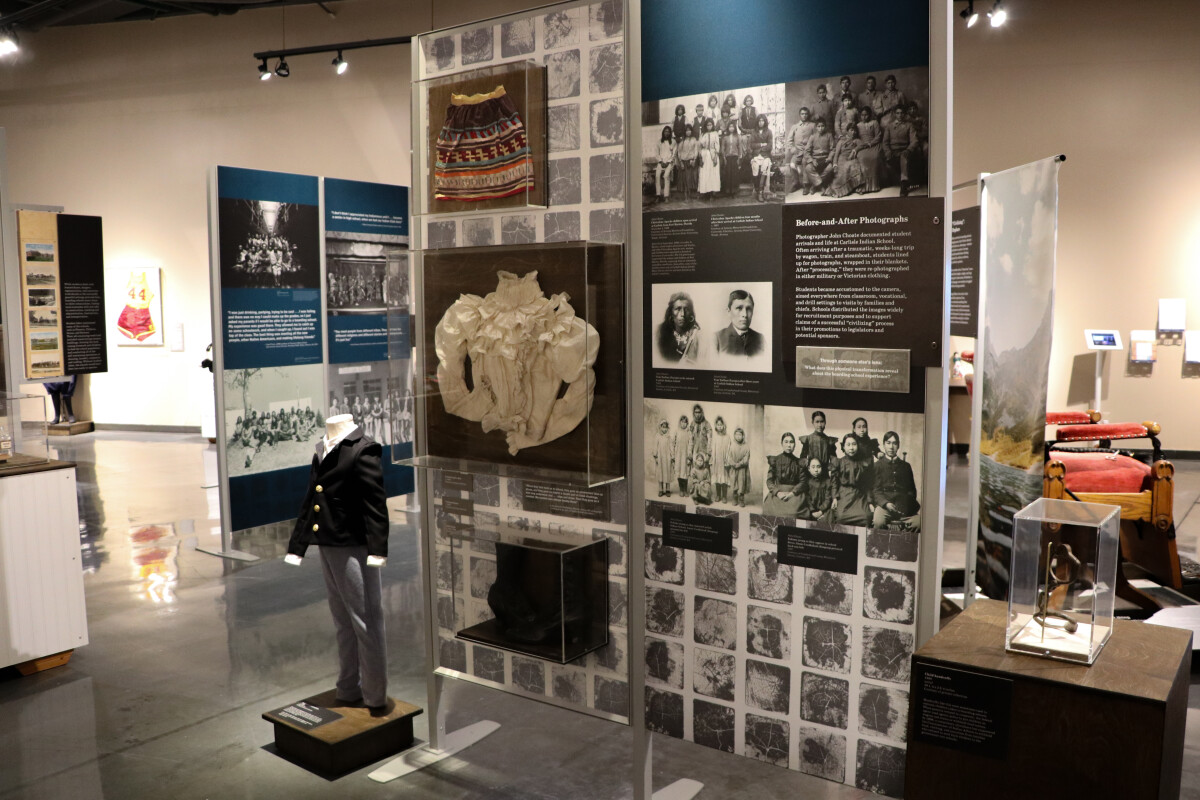
Away from Home Virtual Exhibition
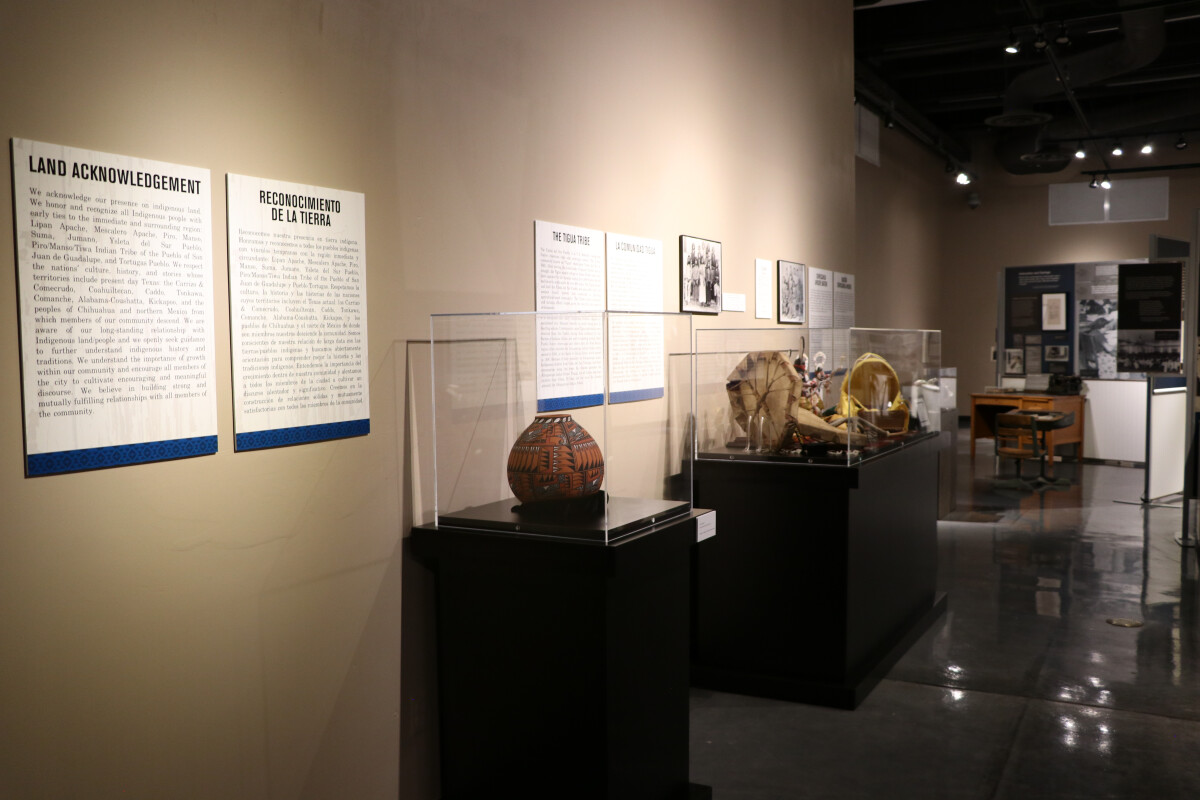
Away from Home Virtual Exhibition
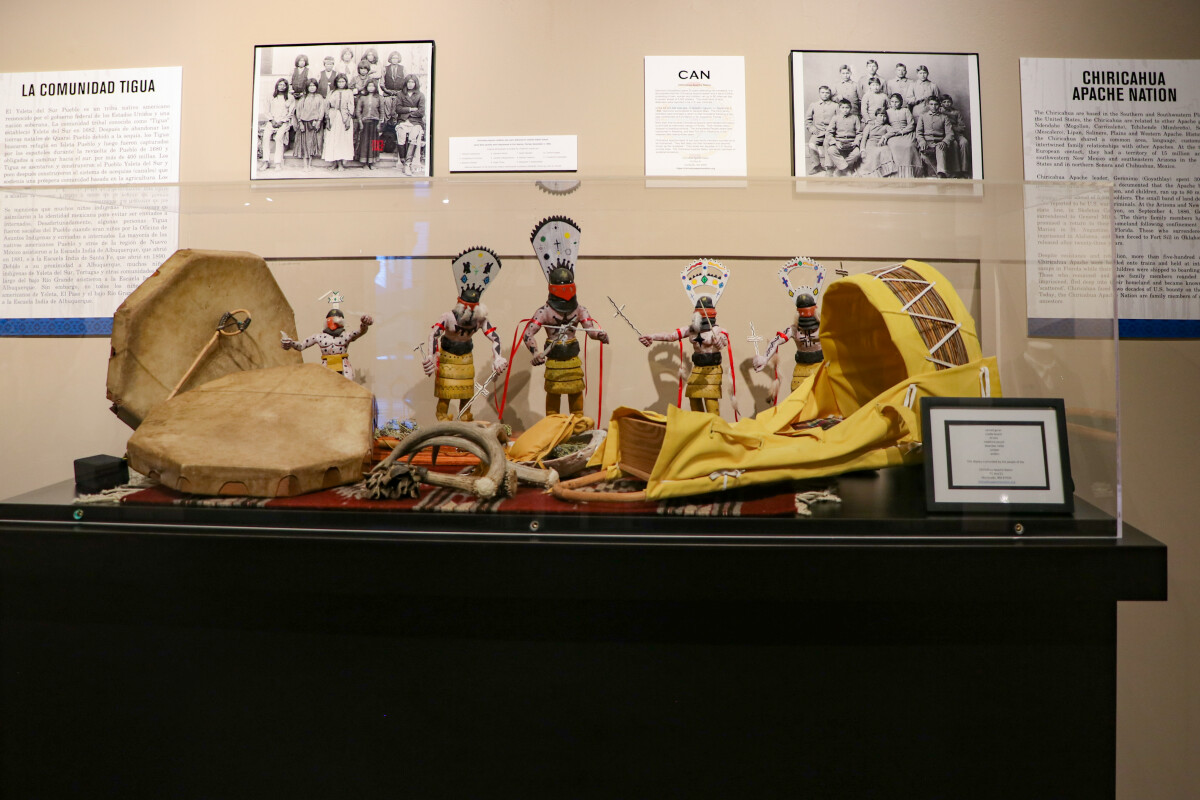
Away from Home Virtual Exhibition
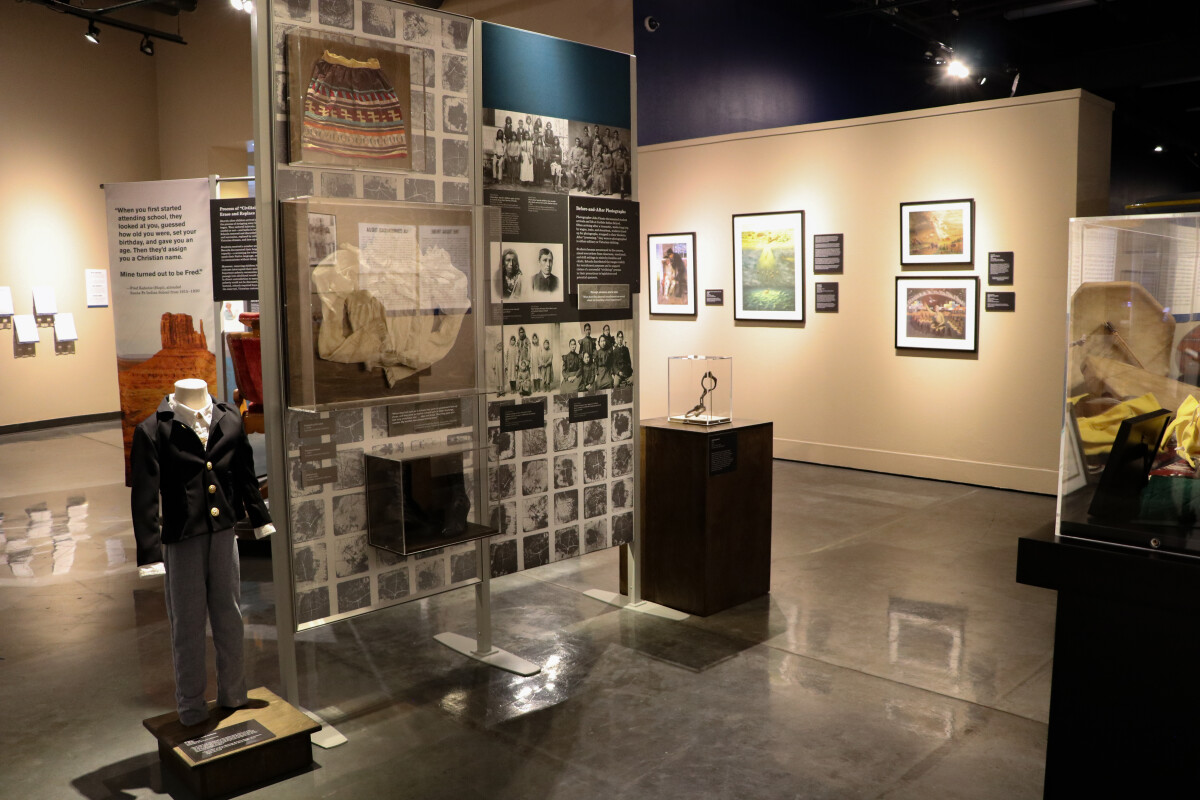
Away from Home Virtual Exhibition
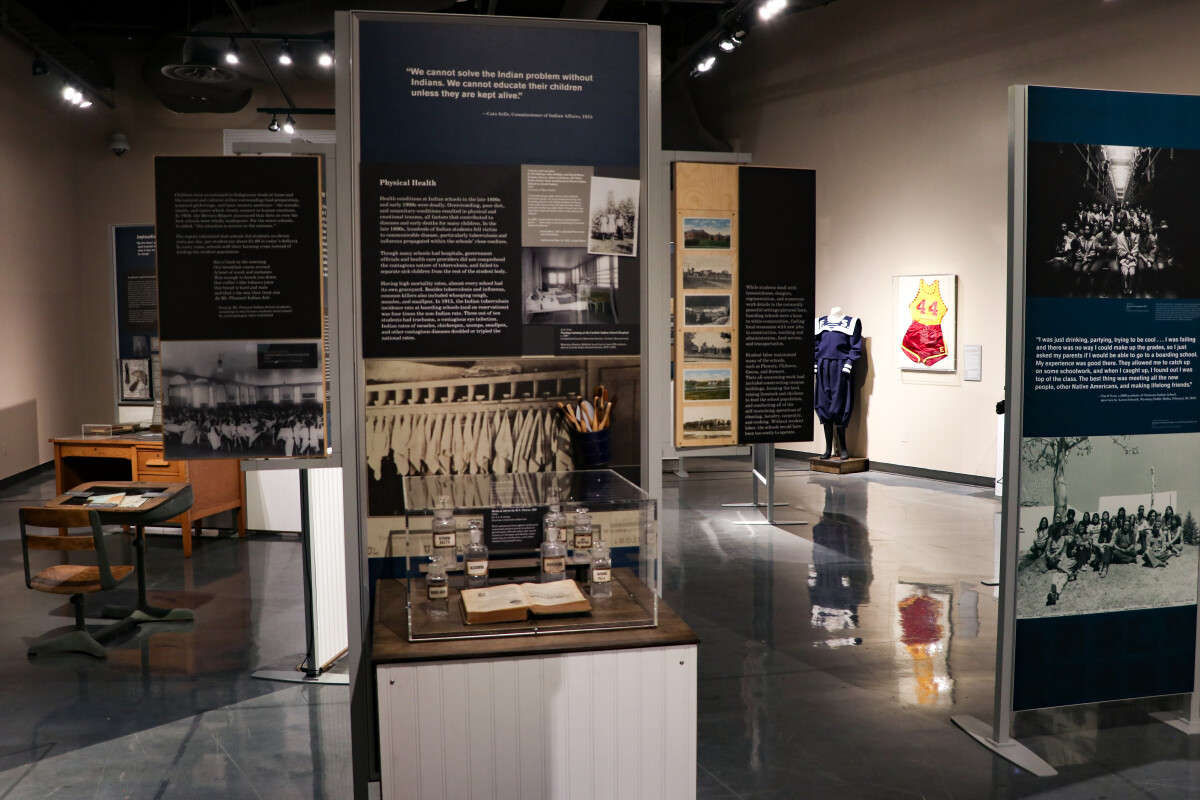
Away from Home Virtual Exhibition
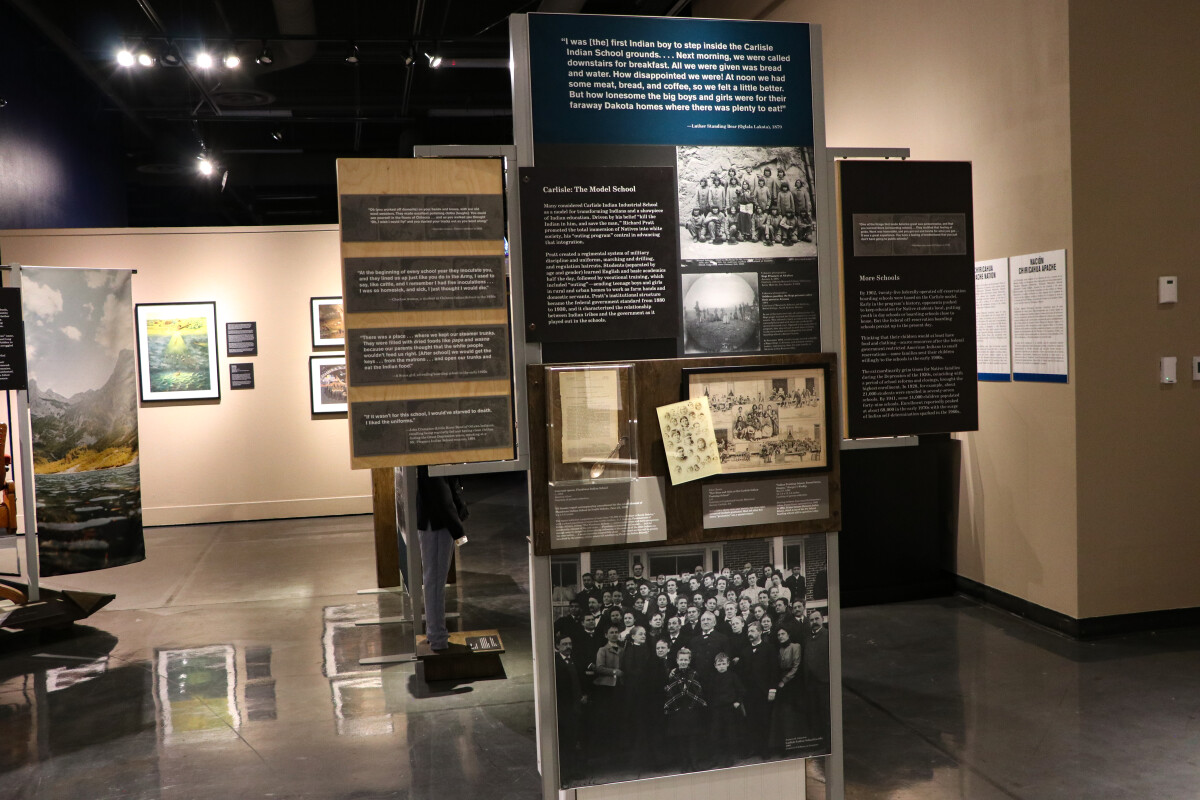
Away from Home Virtual Exhibition
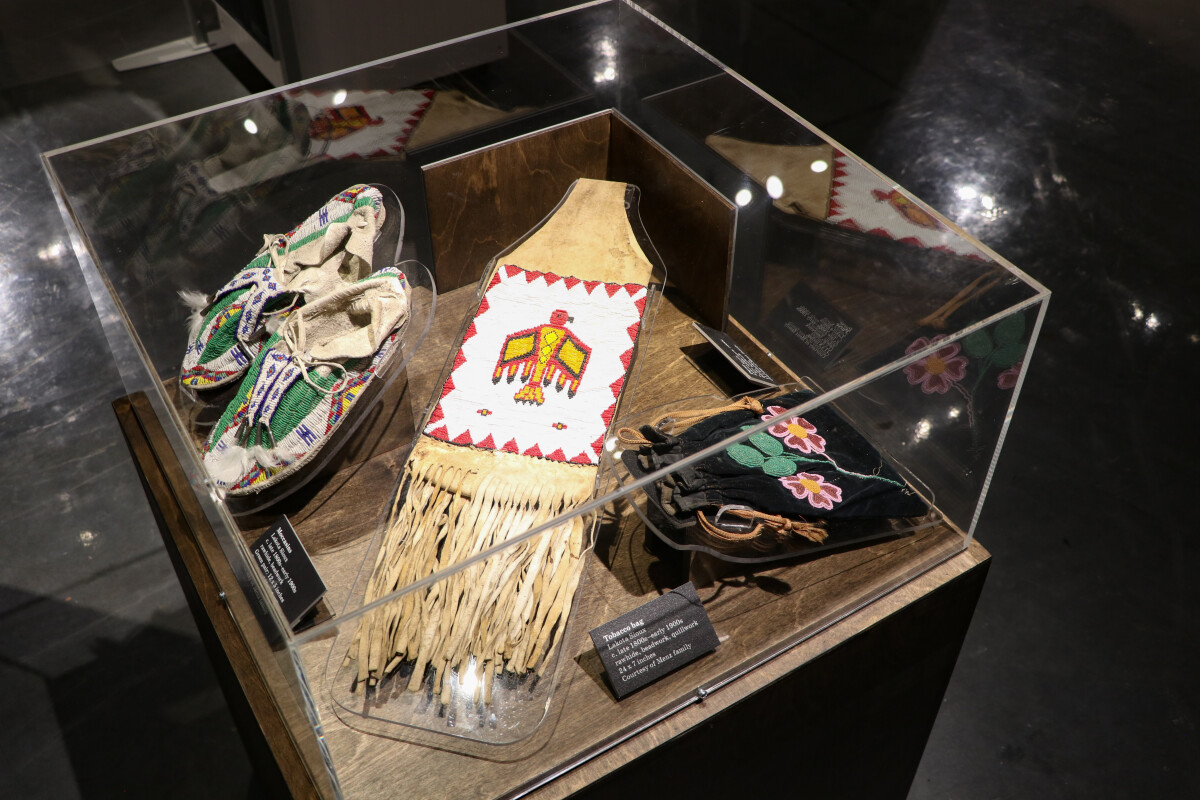
Away from Home Virtual Exhibition
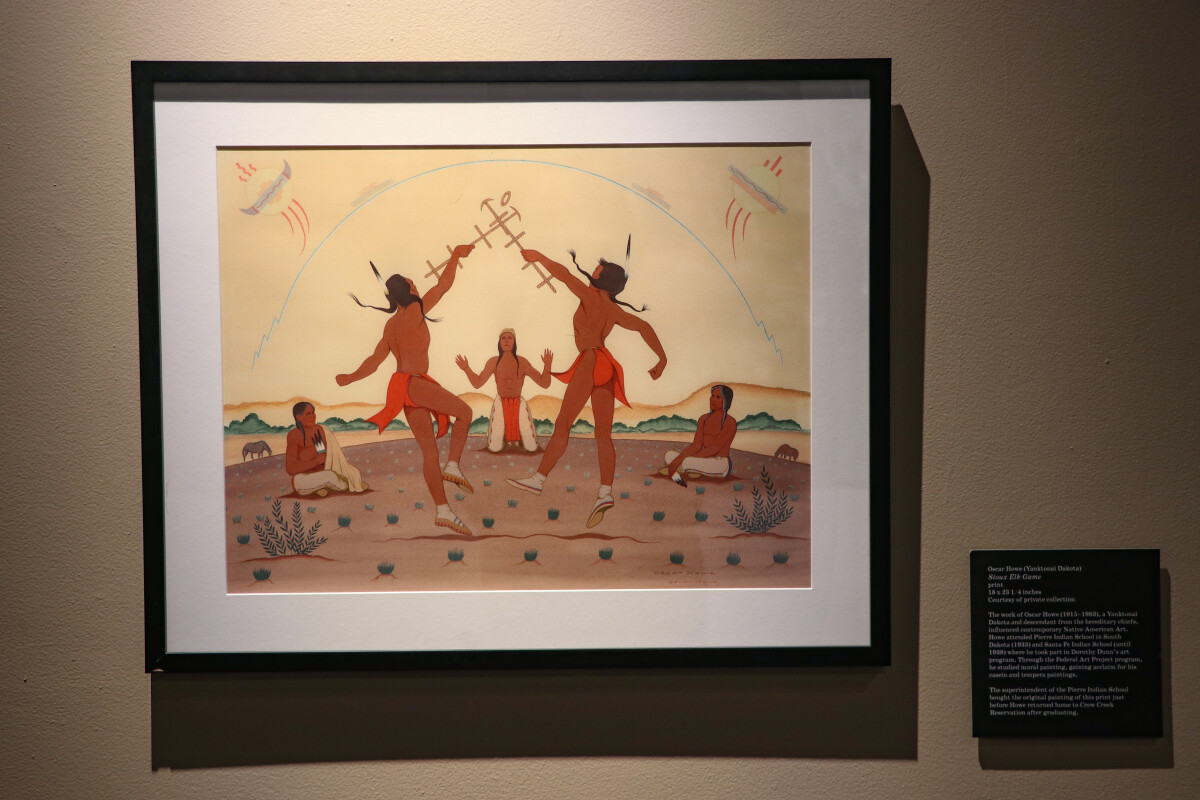
Away from Home Virtual Exhibition
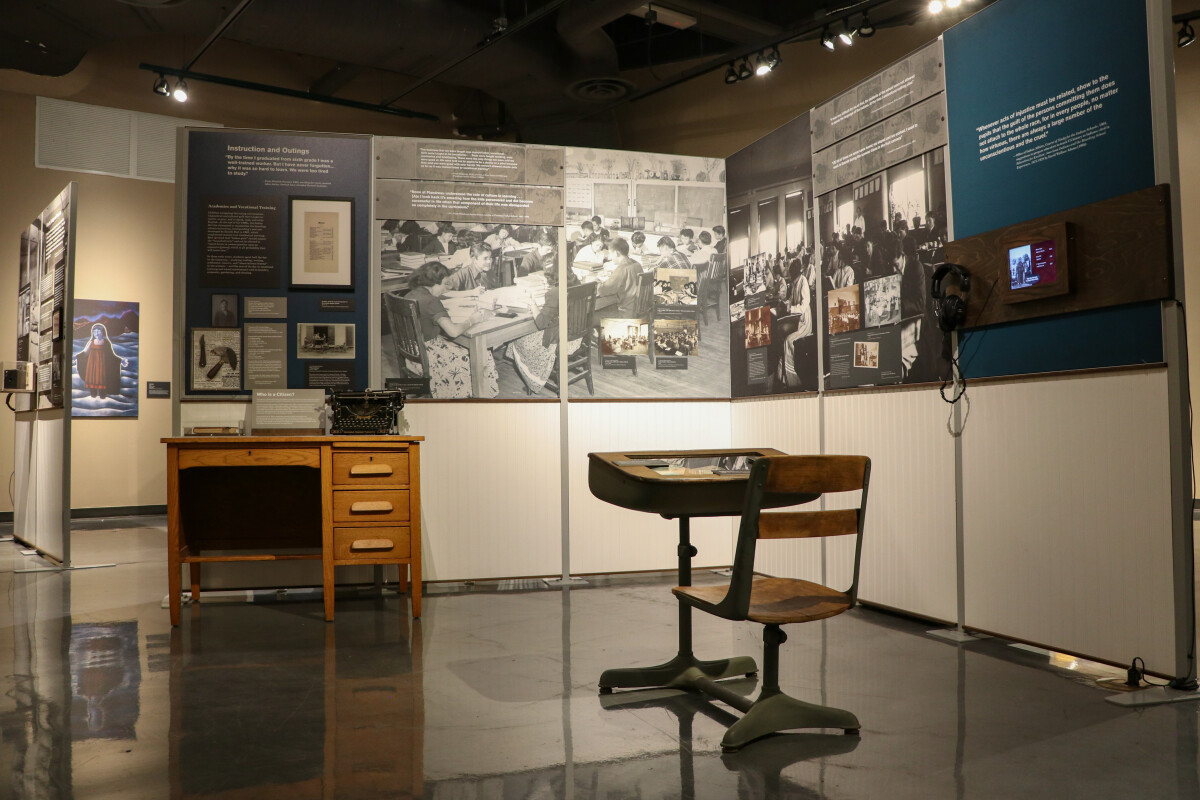
Away from Home Virtual Exhibition
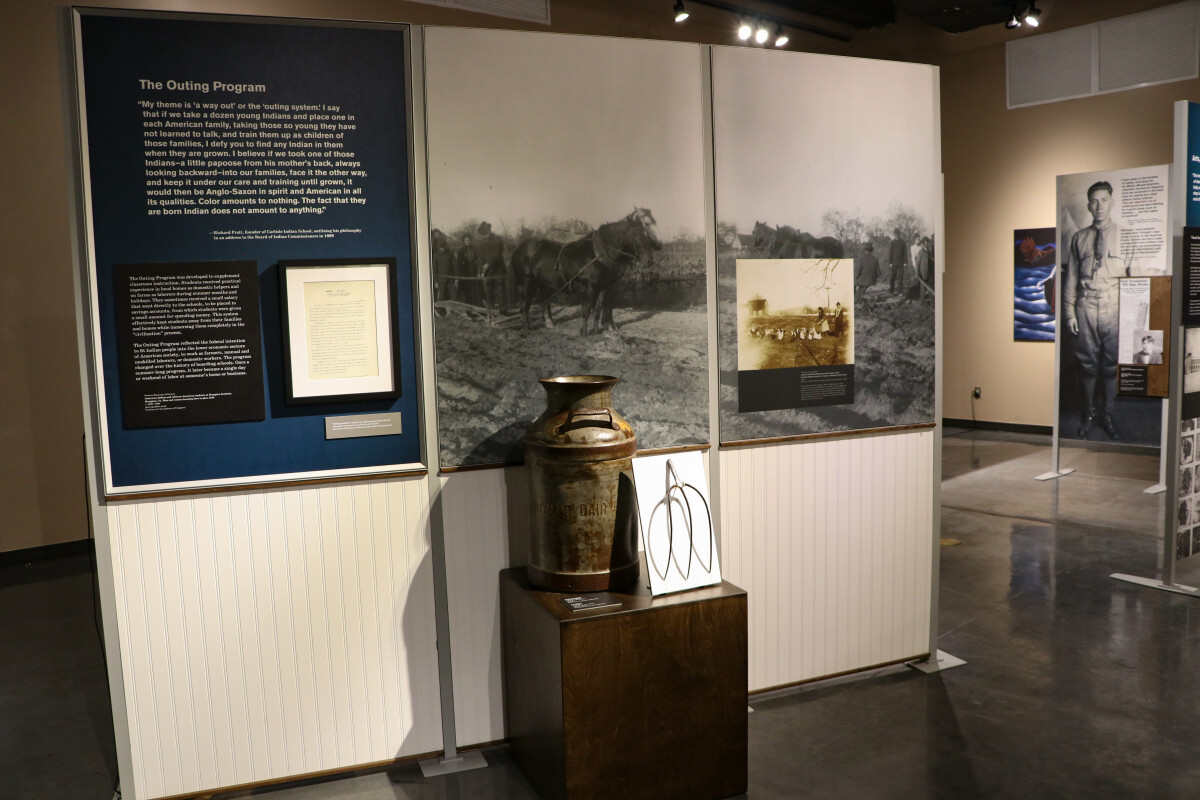
Away from Home Virtual Exhibition
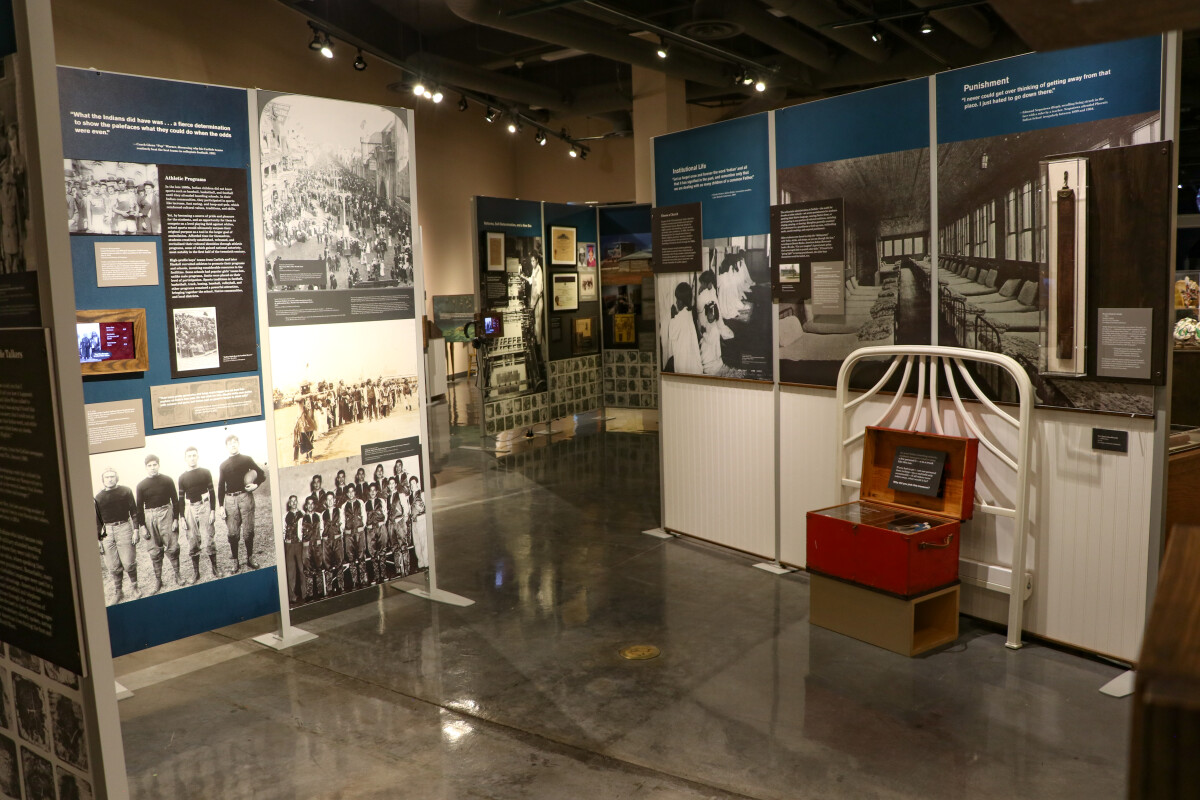
Away from Home Virtual Exhibition
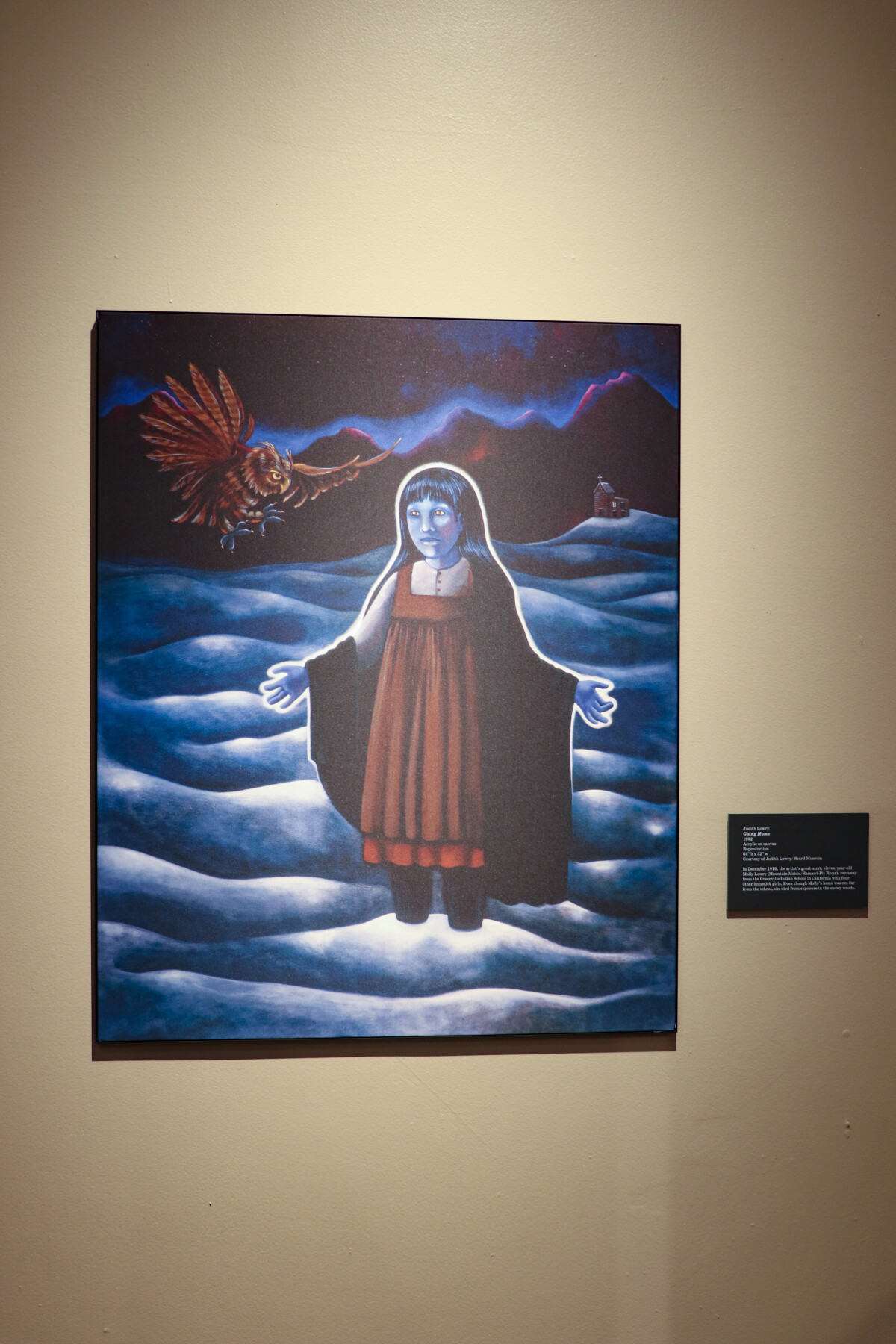
Away from Home Virtual Exhibition
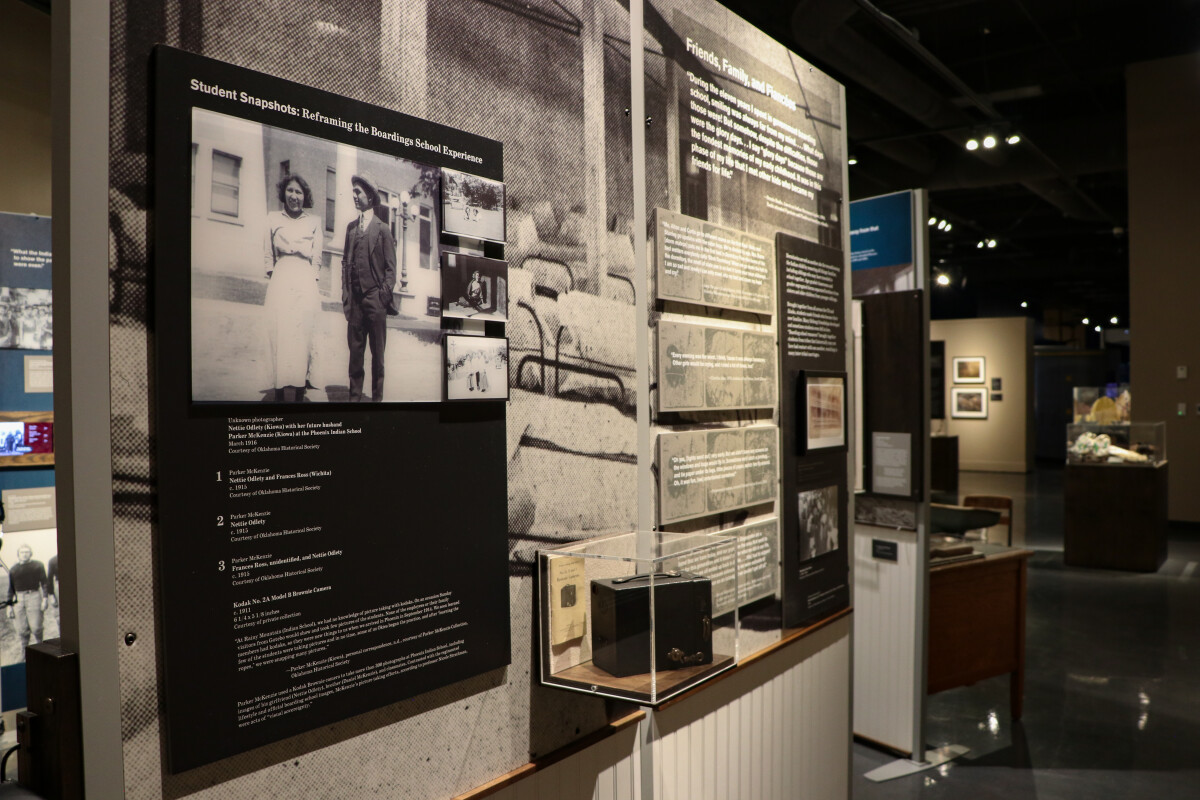
Away from Home Virtual Exhibition
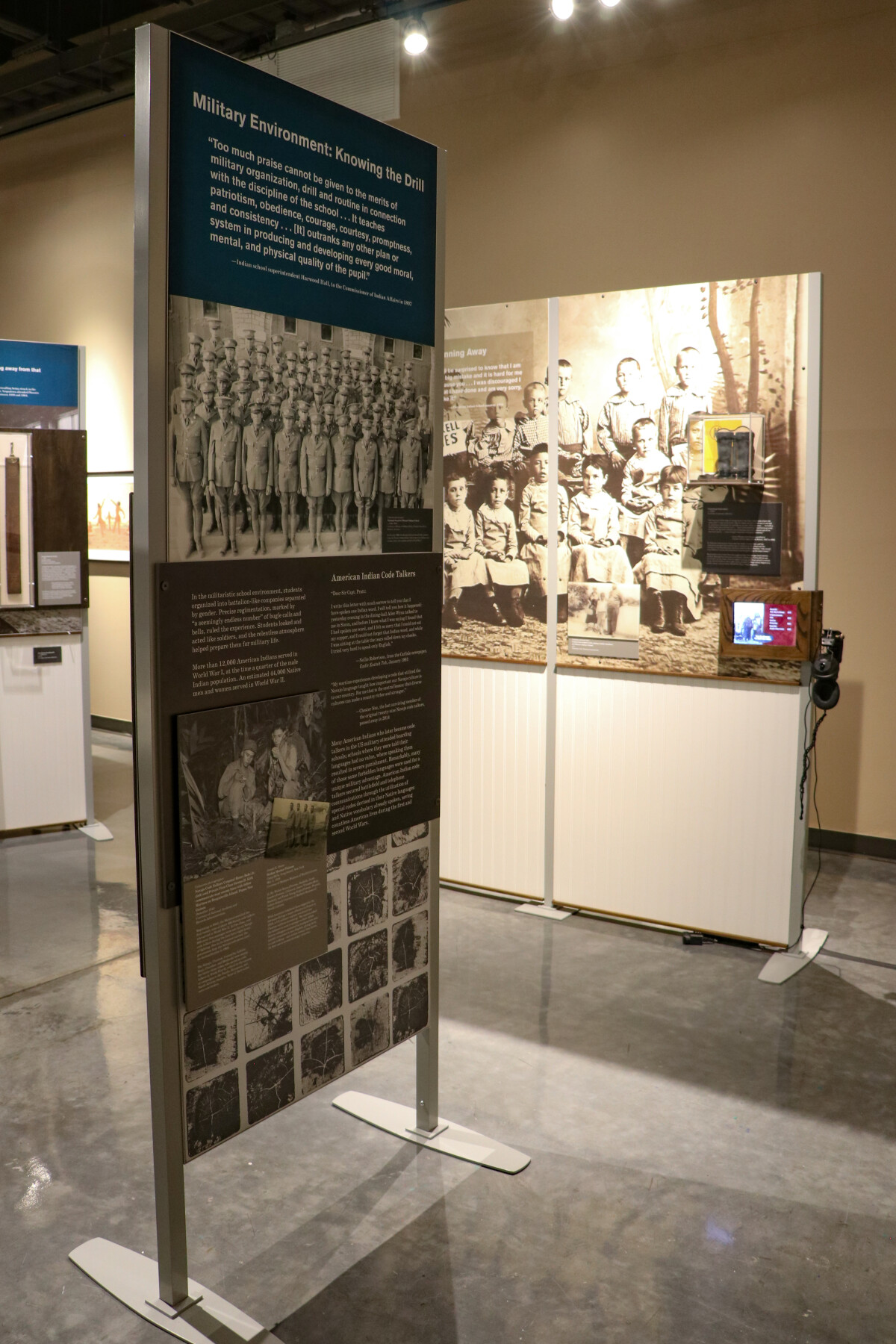
Away from Home Virtual Exhibition
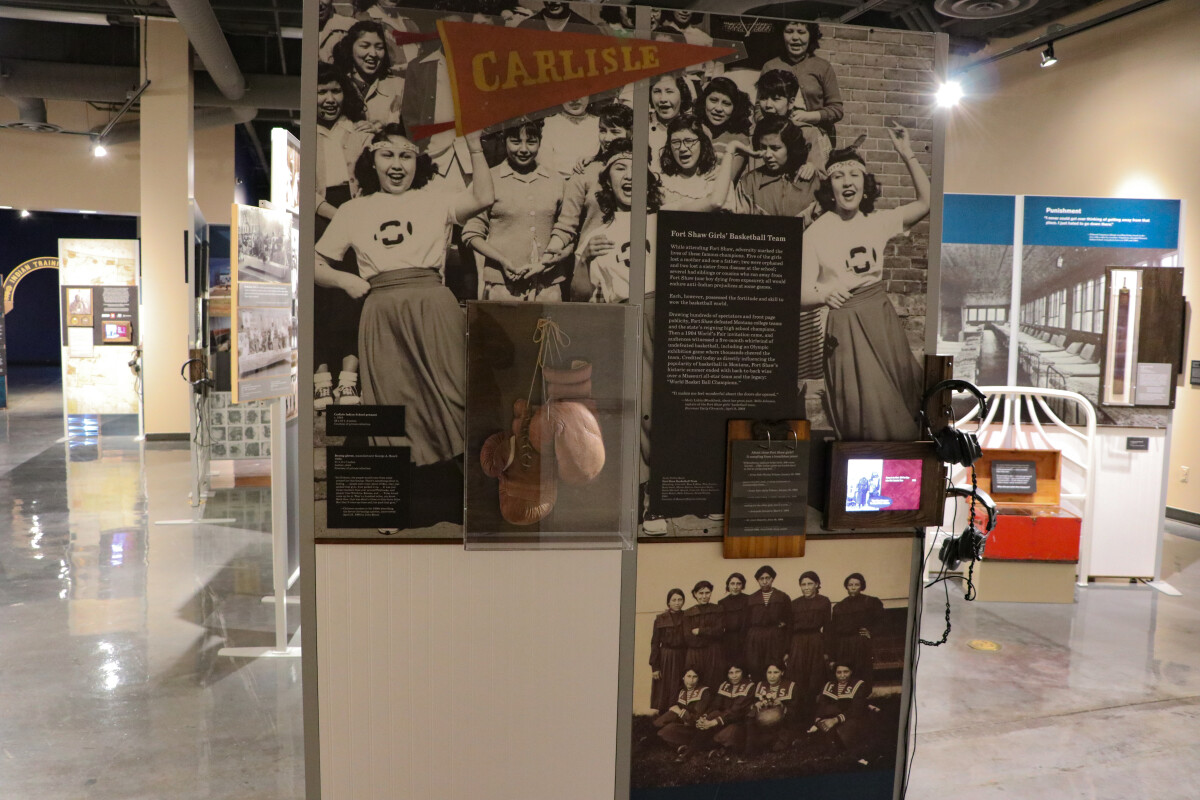
Away from Home Virtual Exhibition
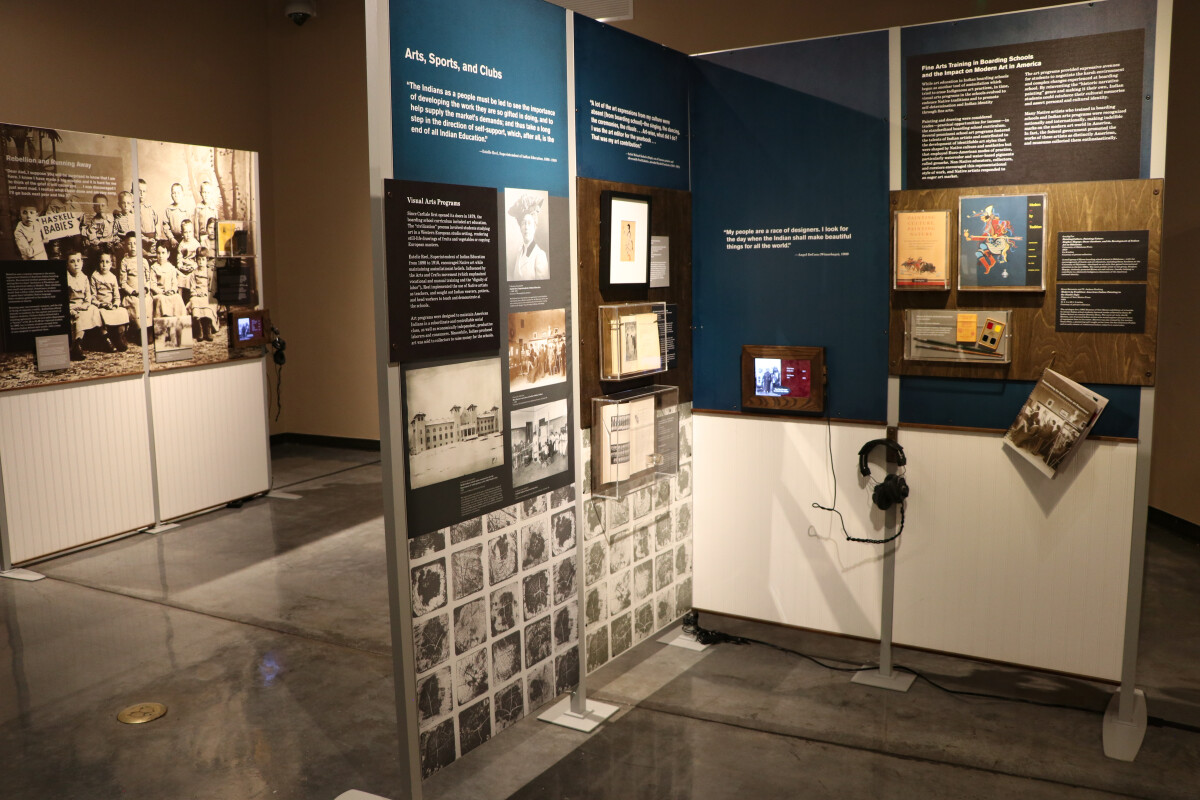
Away from Home Virtual Exhibition
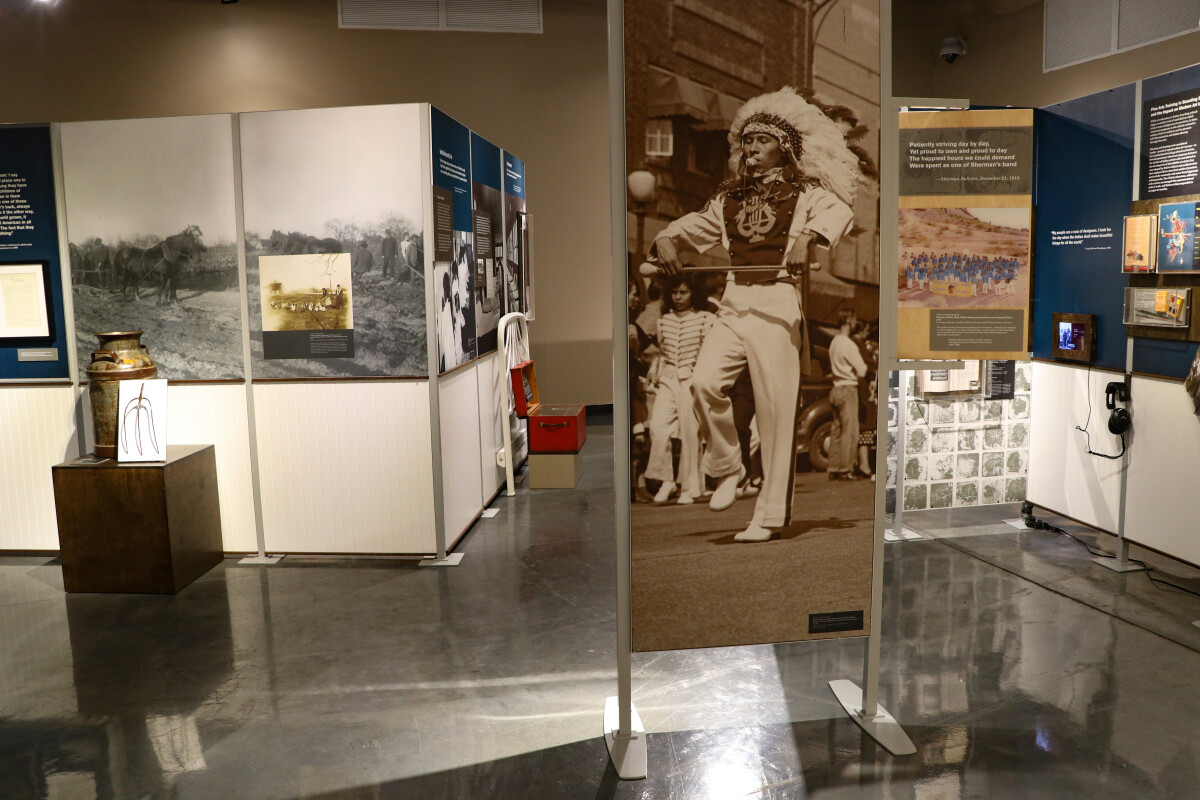
Away from Home Virtual Exhibition
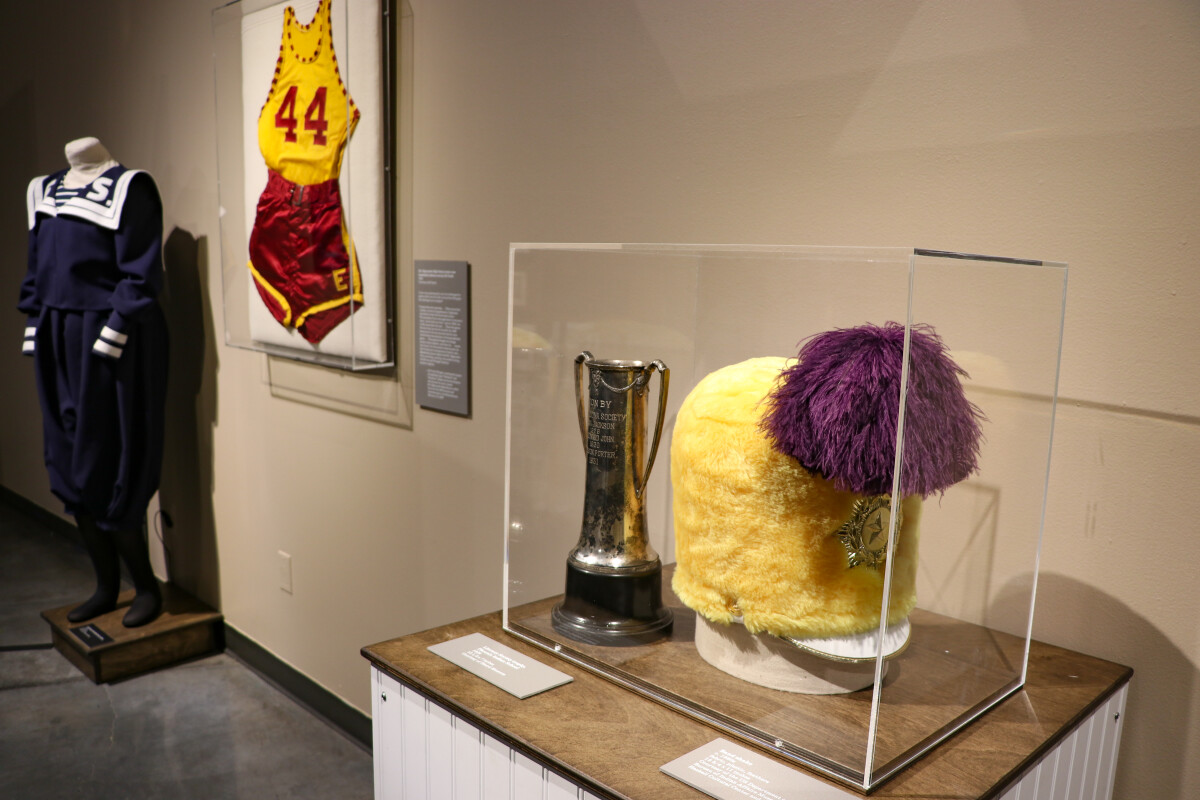
Away from Home Virtual Exhibition
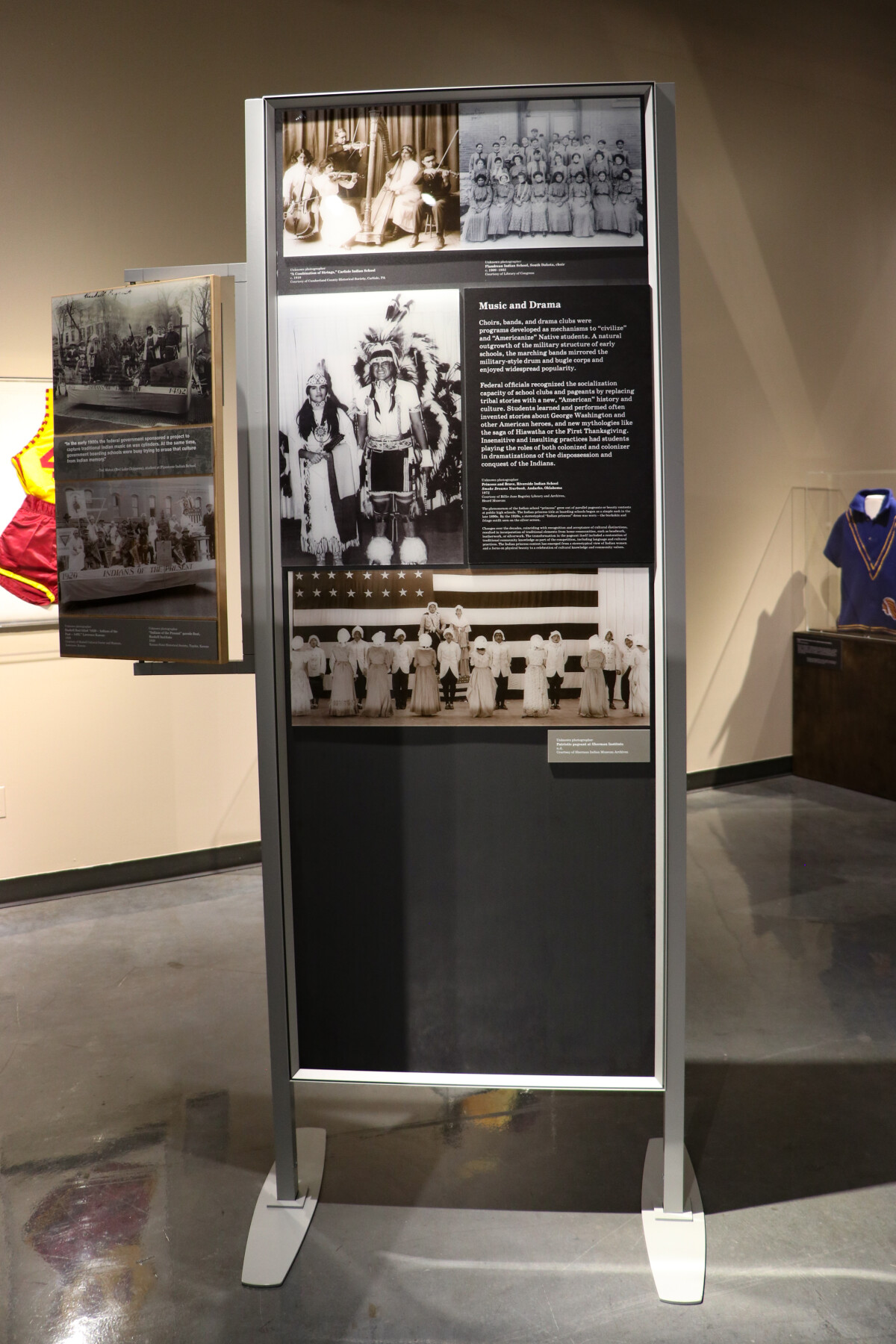
Away from Home Virtual Exhibition
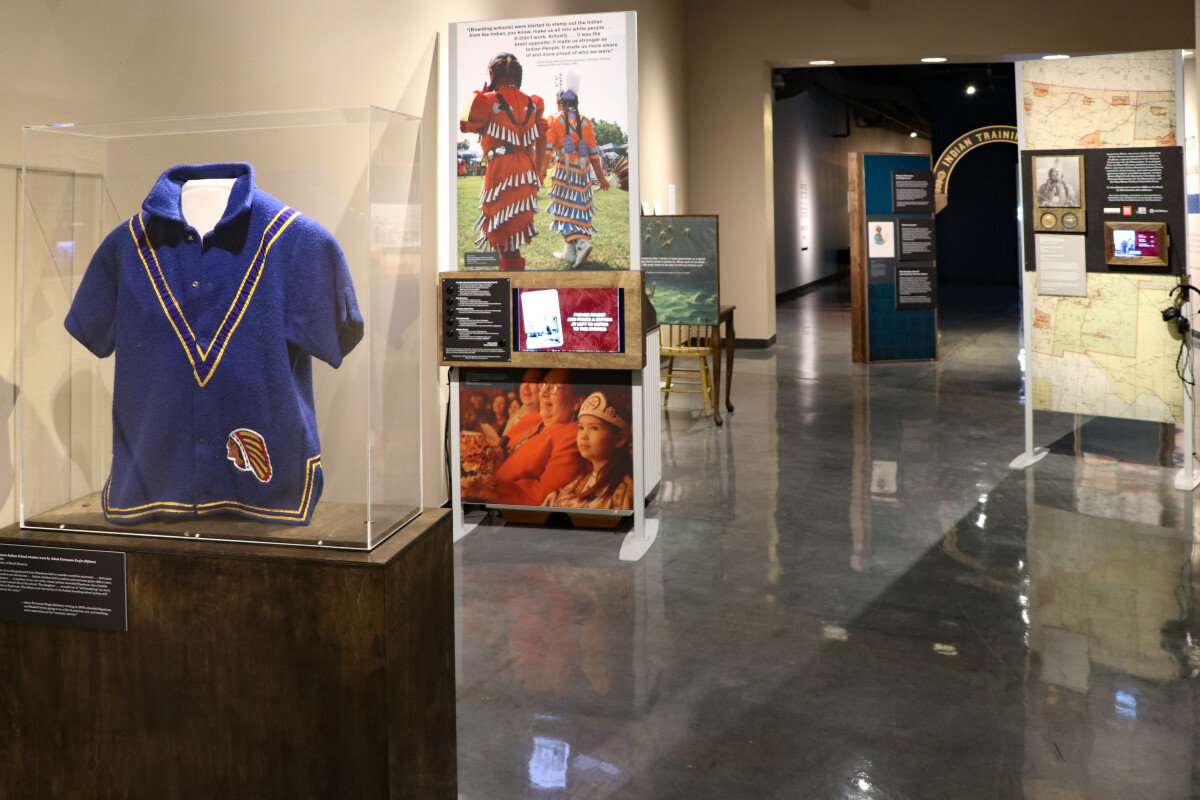
Away from Home Virtual Exhibition
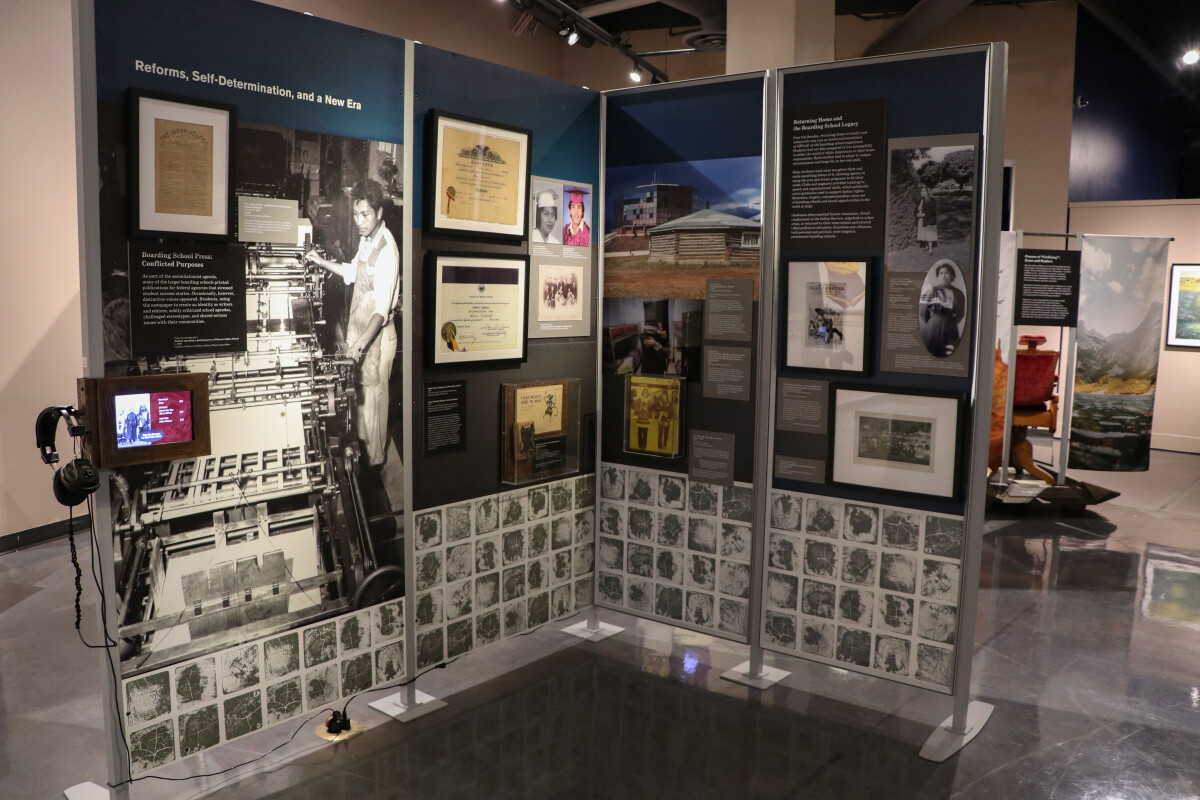
Away from Home Virtual Exhibition
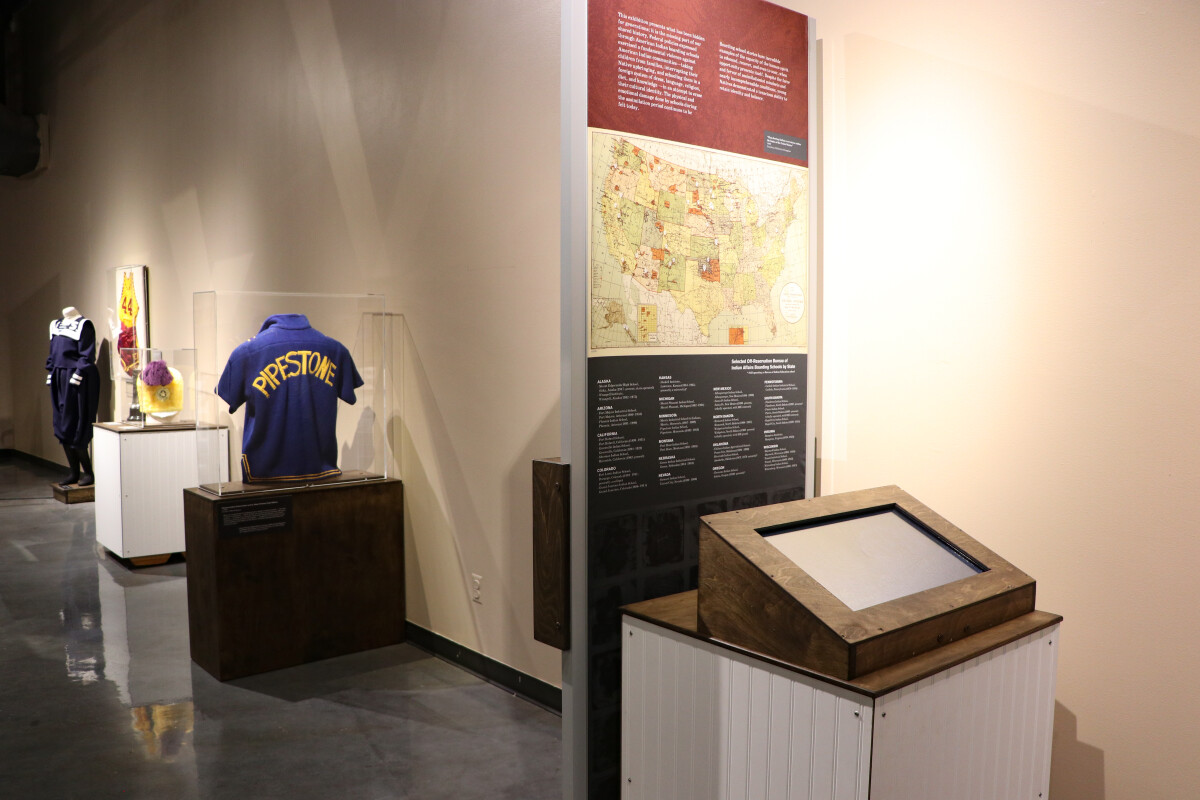
Away from Home Virtual Exhibition
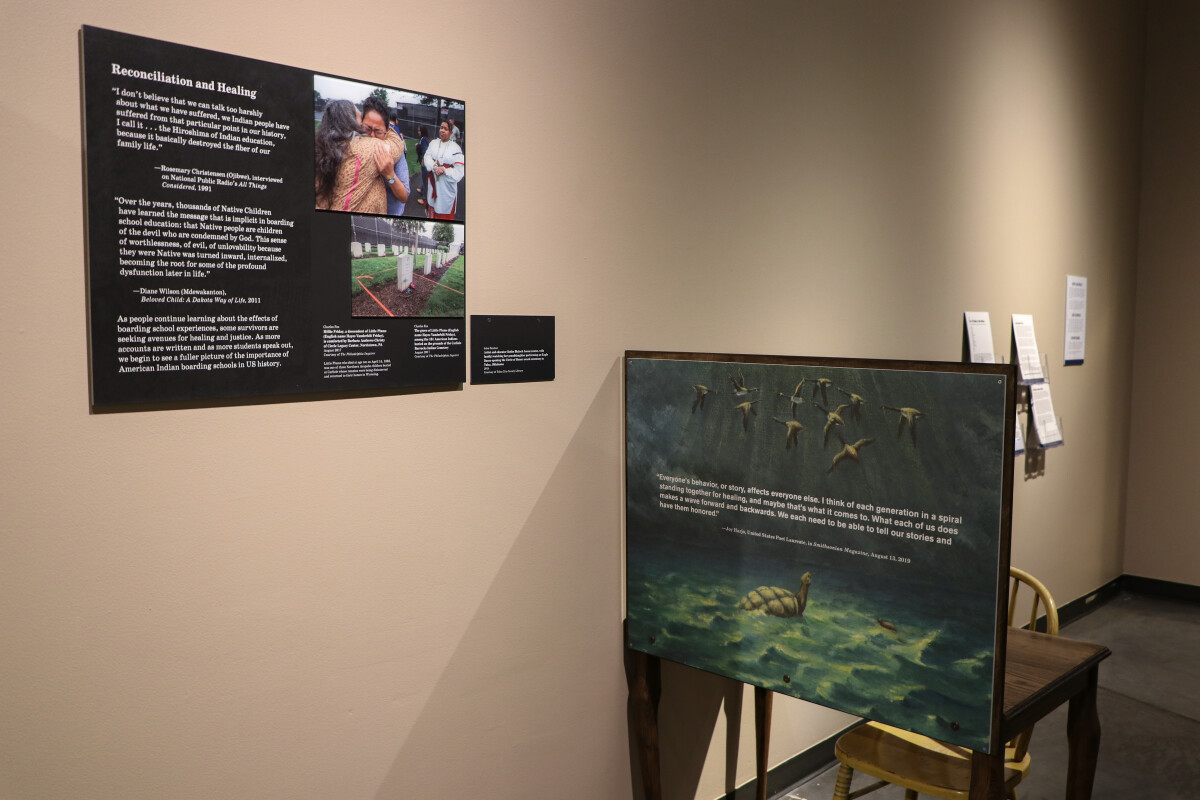
Away from Home Virtual Exhibition
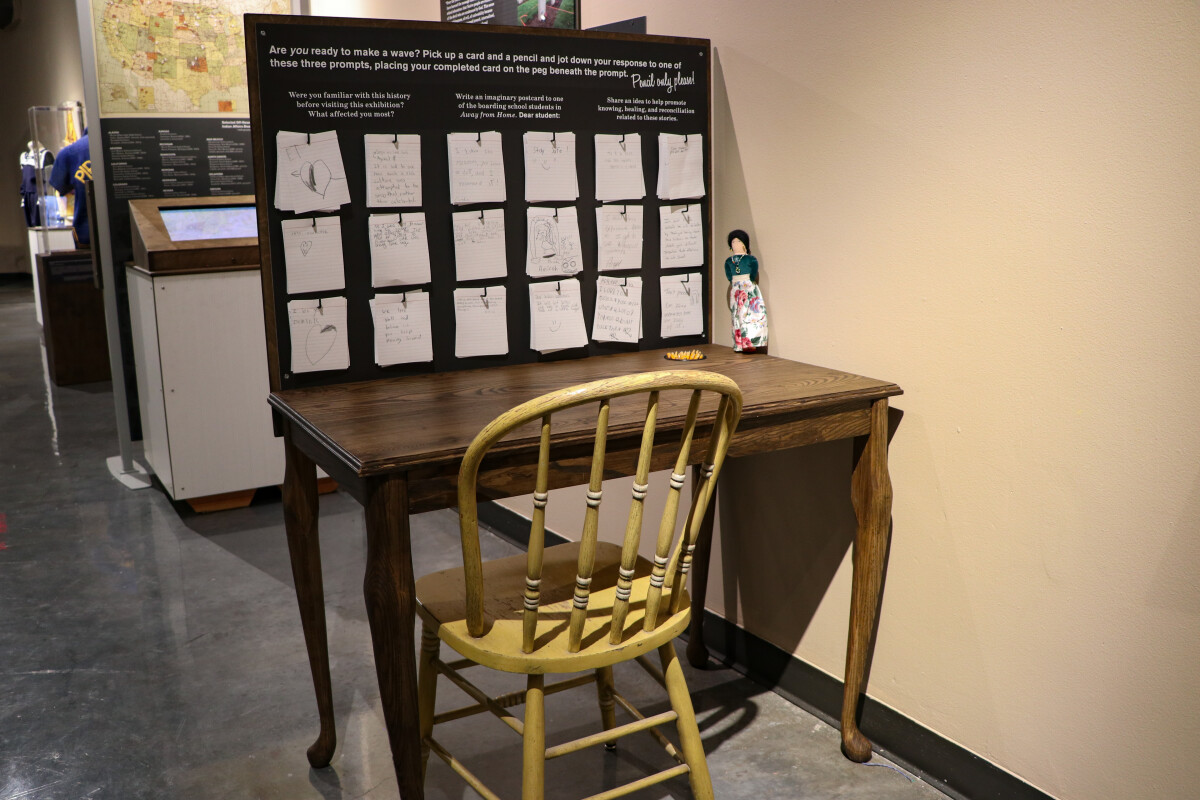
Away from Home: American Indian Boarding School Stories Virtual Exhibition
Beginning in the 1870s, the US government attempted to educate and assimilate American Indians into “civilized” society by placing children—of all ages, from thousands of homes and hundreds of diverse tribes—in distant, residential boarding schools. Many were forcibly taken from their families and communities and stripped of all signs of “Indianness,” even forbidden to speak their own language amongst themselves. Up until the 1930s, students were trained for domestic work and trade in a highly regimented environment. Many children went years without familial contact, and these events had a lasting, generational impact. "Away from Home: American Indian Boarding School Stories" explores off-reservation boarding schools in a kaleidoscope of voices. NOTE: "Away from Home" contains stories of resilience and revitalization, agency and honor. Please be aware that it also contains descriptions of human indignities and hardships and terms that reflect historically racist perspectives and language from past eras. In speaking the truth about acts of seemingly unfathomable violence and suffering in the lives of Native peoples, this exhibition is advised for more mature audience members, grades eight to adult.
Area: Central / Downtown
Source: El Paso Museum of History
Uploaded by: El Paso Museum of History
Away from Home: American Indian Boarding School Stories Virtual Exhibition
Beginning in the 1870s, the US government attempted to educate and assimilate American Indians into “civilized” society by placing children—of all ages, from thousands of homes and hundreds of diverse tribes—in distant, residential boarding schools. Many were forcibly taken from their families and communities and stripped of all signs of “Indianness,” even forbidden to speak their own language amongst themselves. Up until the 1930s, students were trained for domestic work and trade in a highly regimented environment. Many children went years without familial contact, and these events had a lasting, generational impact. "Away from Home: American Indian Boarding School Stories" explores off-reservation boarding schools in a kaleidoscope of voices. NOTE: "Away from Home" contains stories of resilience and revitalization, agency and honor. Please be aware that it also contains descriptions of human indignities and hardships and terms that reflect historically racist perspectives and language from past eras. In speaking the truth about acts of seemingly unfathomable violence and suffering in the lives of Native peoples, this exhibition is advised for more mature audience members, grades eight to adult.
Area: Central / Downtown
Source: El Paso Museum of History
Uploaded by: El Paso Museum of History
Away from Home: American Indian Boarding School Stories Virtual Exhibition
Beginning in the 1870s, the US government attempted to educate and assimilate American Indians into “civilized” society by placing children—of all ages, from thousands of homes and hundreds of diverse tribes—in distant, residential boarding schools. Many were forcibly taken from their families and communities and stripped of all signs of “Indianness,” even forbidden to speak their own language amongst themselves. Up until the 1930s, students were trained for domestic work and trade in a highly regimented environment. Many children went years without familial contact, and these events had a lasting, generational impact. "Away from Home: American Indian Boarding School Stories" explores off-reservation boarding schools in a kaleidoscope of voices. NOTE: "Away from Home" contains stories of resilience and revitalization, agency and honor. Please be aware that it also contains descriptions of human indignities and hardships and terms that reflect historically racist perspectives and language from past eras. In speaking the truth about acts of seemingly unfathomable violence and suffering in the lives of Native peoples, this exhibition is advised for more mature audience members, grades eight to adult.
Area: Central / Downtown
Source: El Paso Museum of History
Uploaded by: El Paso Museum of History
Away from Home: American Indian Boarding School Stories Virtual Exhibition
Beginning in the 1870s, the US government attempted to educate and assimilate American Indians into “civilized” society by placing children—of all ages, from thousands of homes and hundreds of diverse tribes—in distant, residential boarding schools. Many were forcibly taken from their families and communities and stripped of all signs of “Indianness,” even forbidden to speak their own language amongst themselves. Up until the 1930s, students were trained for domestic work and trade in a highly regimented environment. Many children went years without familial contact, and these events had a lasting, generational impact. "Away from Home: American Indian Boarding School Stories" explores off-reservation boarding schools in a kaleidoscope of voices. NOTE: "Away from Home" contains stories of resilience and revitalization, agency and honor. Please be aware that it also contains descriptions of human indignities and hardships and terms that reflect historically racist perspectives and language from past eras. In speaking the truth about acts of seemingly unfathomable violence and suffering in the lives of Native peoples, this exhibition is advised for more mature audience members, grades eight to adult.
Area: Central / Downtown
Source: El Paso Museum of History
Uploaded by: El Paso Museum of History
Away from Home: American Indian Boarding School Stories Virtual Exhibition
Beginning in the 1870s, the US government attempted to educate and assimilate American Indians into “civilized” society by placing children—of all ages, from thousands of homes and hundreds of diverse tribes—in distant, residential boarding schools. Many were forcibly taken from their families and communities and stripped of all signs of “Indianness,” even forbidden to speak their own language amongst themselves. Up until the 1930s, students were trained for domestic work and trade in a highly regimented environment. Many children went years without familial contact, and these events had a lasting, generational impact. "Away from Home: American Indian Boarding School Stories" explores off-reservation boarding schools in a kaleidoscope of voices. NOTE: "Away from Home" contains stories of resilience and revitalization, agency and honor. Please be aware that it also contains descriptions of human indignities and hardships and terms that reflect historically racist perspectives and language from past eras. In speaking the truth about acts of seemingly unfathomable violence and suffering in the lives of Native peoples, this exhibition is advised for more mature audience members, grades eight to adult.
Area: Central / Downtown
Source: El Paso Museum of History
Uploaded by: El Paso Museum of History
Away from Home: American Indian Boarding School Stories Virtual Exhibition
Beginning in the 1870s, the US government attempted to educate and assimilate American Indians into “civilized” society by placing children—of all ages, from thousands of homes and hundreds of diverse tribes—in distant, residential boarding schools. Many were forcibly taken from their families and communities and stripped of all signs of “Indianness,” even forbidden to speak their own language amongst themselves. Up until the 1930s, students were trained for domestic work and trade in a highly regimented environment. Many children went years without familial contact, and these events had a lasting, generational impact. "Away from Home: American Indian Boarding School Stories" explores off-reservation boarding schools in a kaleidoscope of voices. NOTE: "Away from Home" contains stories of resilience and revitalization, agency and honor. Please be aware that it also contains descriptions of human indignities and hardships and terms that reflect historically racist perspectives and language from past eras. In speaking the truth about acts of seemingly unfathomable violence and suffering in the lives of Native peoples, this exhibition is advised for more mature audience members, grades eight to adult.
Area: Central / Downtown
Source: El Paso Museum of History
Uploaded by: El Paso Museum of History
Away from Home: American Indian Boarding School Stories Virtual Exhibition
Beginning in the 1870s, the US government attempted to educate and assimilate American Indians into “civilized” society by placing children—of all ages, from thousands of homes and hundreds of diverse tribes—in distant, residential boarding schools. Many were forcibly taken from their families and communities and stripped of all signs of “Indianness,” even forbidden to speak their own language amongst themselves. Up until the 1930s, students were trained for domestic work and trade in a highly regimented environment. Many children went years without familial contact, and these events had a lasting, generational impact. "Away from Home: American Indian Boarding School Stories" explores off-reservation boarding schools in a kaleidoscope of voices. NOTE: "Away from Home" contains stories of resilience and revitalization, agency and honor. Please be aware that it also contains descriptions of human indignities and hardships and terms that reflect historically racist perspectives and language from past eras. In speaking the truth about acts of seemingly unfathomable violence and suffering in the lives of Native peoples, this exhibition is advised for more mature audience members, grades eight to adult.
Area: Central / Downtown
Source: El Paso Museum of History
Uploaded by: El Paso Museum of History
Away from Home: American Indian Boarding School Stories Virtual Exhibition
Beginning in the 1870s, the US government attempted to educate and assimilate American Indians into “civilized” society by placing children—of all ages, from thousands of homes and hundreds of diverse tribes—in distant, residential boarding schools. Many were forcibly taken from their families and communities and stripped of all signs of “Indianness,” even forbidden to speak their own language amongst themselves. Up until the 1930s, students were trained for domestic work and trade in a highly regimented environment. Many children went years without familial contact, and these events had a lasting, generational impact. "Away from Home: American Indian Boarding School Stories" explores off-reservation boarding schools in a kaleidoscope of voices. NOTE: "Away from Home" contains stories of resilience and revitalization, agency and honor. Please be aware that it also contains descriptions of human indignities and hardships and terms that reflect historically racist perspectives and language from past eras. In speaking the truth about acts of seemingly unfathomable violence and suffering in the lives of Native peoples, this exhibition is advised for more mature audience members, grades eight to adult.
Area: Central / Downtown
Source: El Paso Museum of History
Uploaded by: El Paso Museum of History
Away from Home: American Indian Boarding School Stories Virtual Exhibition
Beginning in the 1870s, the US government attempted to educate and assimilate American Indians into “civilized” society by placing children—of all ages, from thousands of homes and hundreds of diverse tribes—in distant, residential boarding schools. Many were forcibly taken from their families and communities and stripped of all signs of “Indianness,” even forbidden to speak their own language amongst themselves. Up until the 1930s, students were trained for domestic work and trade in a highly regimented environment. Many children went years without familial contact, and these events had a lasting, generational impact. "Away from Home: American Indian Boarding School Stories" explores off-reservation boarding schools in a kaleidoscope of voices. NOTE: "Away from Home" contains stories of resilience and revitalization, agency and honor. Please be aware that it also contains descriptions of human indignities and hardships and terms that reflect historically racist perspectives and language from past eras. In speaking the truth about acts of seemingly unfathomable violence and suffering in the lives of Native peoples, this exhibition is advised for more mature audience members, grades eight to adult.
Area: Central / Downtown
Source: El Paso Museum of History
Uploaded by: El Paso Museum of History
Away from Home: American Indian Boarding School Stories Virtual Exhibition
Beginning in the 1870s, the US government attempted to educate and assimilate American Indians into “civilized” society by placing children—of all ages, from thousands of homes and hundreds of diverse tribes—in distant, residential boarding schools. Many were forcibly taken from their families and communities and stripped of all signs of “Indianness,” even forbidden to speak their own language amongst themselves. Up until the 1930s, students were trained for domestic work and trade in a highly regimented environment. Many children went years without familial contact, and these events had a lasting, generational impact. "Away from Home: American Indian Boarding School Stories" explores off-reservation boarding schools in a kaleidoscope of voices. NOTE: "Away from Home" contains stories of resilience and revitalization, agency and honor. Please be aware that it also contains descriptions of human indignities and hardships and terms that reflect historically racist perspectives and language from past eras. In speaking the truth about acts of seemingly unfathomable violence and suffering in the lives of Native peoples, this exhibition is advised for more mature audience members, grades eight to adult.
Area: Central / Downtown
Source: El Paso Museum of History
Uploaded by: El Paso Museum of History
Away from Home: American Indian Boarding School Stories Virtual Exhibition
Beginning in the 1870s, the US government attempted to educate and assimilate American Indians into “civilized” society by placing children—of all ages, from thousands of homes and hundreds of diverse tribes—in distant, residential boarding schools. Many were forcibly taken from their families and communities and stripped of all signs of “Indianness,” even forbidden to speak their own language amongst themselves. Up until the 1930s, students were trained for domestic work and trade in a highly regimented environment. Many children went years without familial contact, and these events had a lasting, generational impact. "Away from Home: American Indian Boarding School Stories" explores off-reservation boarding schools in a kaleidoscope of voices. NOTE: "Away from Home" contains stories of resilience and revitalization, agency and honor. Please be aware that it also contains descriptions of human indignities and hardships and terms that reflect historically racist perspectives and language from past eras. In speaking the truth about acts of seemingly unfathomable violence and suffering in the lives of Native peoples, this exhibition is advised for more mature audience members, grades eight to adult.
Area: Central / Downtown
Source: El Paso Museum of History
Uploaded by: El Paso Museum of History
Away from Home: American Indian Boarding School Stories Virtual Exhibition
Beginning in the 1870s, the US government attempted to educate and assimilate American Indians into “civilized” society by placing children—of all ages, from thousands of homes and hundreds of diverse tribes—in distant, residential boarding schools. Many were forcibly taken from their families and communities and stripped of all signs of “Indianness,” even forbidden to speak their own language amongst themselves. Up until the 1930s, students were trained for domestic work and trade in a highly regimented environment. Many children went years without familial contact, and these events had a lasting, generational impact. "Away from Home: American Indian Boarding School Stories" explores off-reservation boarding schools in a kaleidoscope of voices. NOTE: "Away from Home" contains stories of resilience and revitalization, agency and honor. Please be aware that it also contains descriptions of human indignities and hardships and terms that reflect historically racist perspectives and language from past eras. In speaking the truth about acts of seemingly unfathomable violence and suffering in the lives of Native peoples, this exhibition is advised for more mature audience members, grades eight to adult.
Area: Central / Downtown
Source: El Paso Museum of History
Uploaded by: El Paso Museum of History
Away from Home: American Indian Boarding School Stories Virtual Exhibition
Beginning in the 1870s, the US government attempted to educate and assimilate American Indians into “civilized” society by placing children—of all ages, from thousands of homes and hundreds of diverse tribes—in distant, residential boarding schools. Many were forcibly taken from their families and communities and stripped of all signs of “Indianness,” even forbidden to speak their own language amongst themselves. Up until the 1930s, students were trained for domestic work and trade in a highly regimented environment. Many children went years without familial contact, and these events had a lasting, generational impact. "Away from Home: American Indian Boarding School Stories" explores off-reservation boarding schools in a kaleidoscope of voices. NOTE: "Away from Home" contains stories of resilience and revitalization, agency and honor. Please be aware that it also contains descriptions of human indignities and hardships and terms that reflect historically racist perspectives and language from past eras. In speaking the truth about acts of seemingly unfathomable violence and suffering in the lives of Native peoples, this exhibition is advised for more mature audience members, grades eight to adult.
Area: Central / Downtown
Source: El Paso Museum of History
Uploaded by: El Paso Museum of History
Away from Home: American Indian Boarding School Stories Virtual Exhibition
Beginning in the 1870s, the US government attempted to educate and assimilate American Indians into “civilized” society by placing children—of all ages, from thousands of homes and hundreds of diverse tribes—in distant, residential boarding schools. Many were forcibly taken from their families and communities and stripped of all signs of “Indianness,” even forbidden to speak their own language amongst themselves. Up until the 1930s, students were trained for domestic work and trade in a highly regimented environment. Many children went years without familial contact, and these events had a lasting, generational impact. "Away from Home: American Indian Boarding School Stories" explores off-reservation boarding schools in a kaleidoscope of voices. NOTE: "Away from Home" contains stories of resilience and revitalization, agency and honor. Please be aware that it also contains descriptions of human indignities and hardships and terms that reflect historically racist perspectives and language from past eras. In speaking the truth about acts of seemingly unfathomable violence and suffering in the lives of Native peoples, this exhibition is advised for more mature audience members, grades eight to adult.
Area: Central / Downtown
Source: El Paso Museum of History
Uploaded by: El Paso Museum of History
Away from Home: American Indian Boarding School Stories Virtual Exhibition
Beginning in the 1870s, the US government attempted to educate and assimilate American Indians into “civilized” society by placing children—of all ages, from thousands of homes and hundreds of diverse tribes—in distant, residential boarding schools. Many were forcibly taken from their families and communities and stripped of all signs of “Indianness,” even forbidden to speak their own language amongst themselves. Up until the 1930s, students were trained for domestic work and trade in a highly regimented environment. Many children went years without familial contact, and these events had a lasting, generational impact. "Away from Home: American Indian Boarding School Stories" explores off-reservation boarding schools in a kaleidoscope of voices. NOTE: "Away from Home" contains stories of resilience and revitalization, agency and honor. Please be aware that it also contains descriptions of human indignities and hardships and terms that reflect historically racist perspectives and language from past eras. In speaking the truth about acts of seemingly unfathomable violence and suffering in the lives of Native peoples, this exhibition is advised for more mature audience members, grades eight to adult.
Area: Central / Downtown
Source: El Paso Museum of History
Uploaded by: El Paso Museum of History
Away from Home: American Indian Boarding School Stories Virtual Exhibition
Beginning in the 1870s, the US government attempted to educate and assimilate American Indians into “civilized” society by placing children—of all ages, from thousands of homes and hundreds of diverse tribes—in distant, residential boarding schools. Many were forcibly taken from their families and communities and stripped of all signs of “Indianness,” even forbidden to speak their own language amongst themselves. Up until the 1930s, students were trained for domestic work and trade in a highly regimented environment. Many children went years without familial contact, and these events had a lasting, generational impact. "Away from Home: American Indian Boarding School Stories" explores off-reservation boarding schools in a kaleidoscope of voices. NOTE: "Away from Home" contains stories of resilience and revitalization, agency and honor. Please be aware that it also contains descriptions of human indignities and hardships and terms that reflect historically racist perspectives and language from past eras. In speaking the truth about acts of seemingly unfathomable violence and suffering in the lives of Native peoples, this exhibition is advised for more mature audience members, grades eight to adult.
Area: Central / Downtown
Source: El Paso Museum of History
Uploaded by: El Paso Museum of History
Away from Home: American Indian Boarding School Stories Virtual Exhibition
Beginning in the 1870s, the US government attempted to educate and assimilate American Indians into “civilized” society by placing children—of all ages, from thousands of homes and hundreds of diverse tribes—in distant, residential boarding schools. Many were forcibly taken from their families and communities and stripped of all signs of “Indianness,” even forbidden to speak their own language amongst themselves. Up until the 1930s, students were trained for domestic work and trade in a highly regimented environment. Many children went years without familial contact, and these events had a lasting, generational impact. "Away from Home: American Indian Boarding School Stories" explores off-reservation boarding schools in a kaleidoscope of voices. NOTE: "Away from Home" contains stories of resilience and revitalization, agency and honor. Please be aware that it also contains descriptions of human indignities and hardships and terms that reflect historically racist perspectives and language from past eras. In speaking the truth about acts of seemingly unfathomable violence and suffering in the lives of Native peoples, this exhibition is advised for more mature audience members, grades eight to adult.
Area: Central / Downtown
Source: El Paso Museum of History
Uploaded by: El Paso Museum of History
Away from Home: American Indian Boarding School Stories Virtual Exhibition
Beginning in the 1870s, the US government attempted to educate and assimilate American Indians into “civilized” society by placing children—of all ages, from thousands of homes and hundreds of diverse tribes—in distant, residential boarding schools. Many were forcibly taken from their families and communities and stripped of all signs of “Indianness,” even forbidden to speak their own language amongst themselves. Up until the 1930s, students were trained for domestic work and trade in a highly regimented environment. Many children went years without familial contact, and these events had a lasting, generational impact. "Away from Home: American Indian Boarding School Stories" explores off-reservation boarding schools in a kaleidoscope of voices. NOTE: "Away from Home" contains stories of resilience and revitalization, agency and honor. Please be aware that it also contains descriptions of human indignities and hardships and terms that reflect historically racist perspectives and language from past eras. In speaking the truth about acts of seemingly unfathomable violence and suffering in the lives of Native peoples, this exhibition is advised for more mature audience members, grades eight to adult.
Area: Central / Downtown
Source: El Paso Museum of History
Uploaded by: El Paso Museum of History
Away from Home: American Indian Boarding School Stories Virtual Exhibition
Beginning in the 1870s, the US government attempted to educate and assimilate American Indians into “civilized” society by placing children—of all ages, from thousands of homes and hundreds of diverse tribes—in distant, residential boarding schools. Many were forcibly taken from their families and communities and stripped of all signs of “Indianness,” even forbidden to speak their own language amongst themselves. Up until the 1930s, students were trained for domestic work and trade in a highly regimented environment. Many children went years without familial contact, and these events had a lasting, generational impact. "Away from Home: American Indian Boarding School Stories" explores off-reservation boarding schools in a kaleidoscope of voices. NOTE: "Away from Home" contains stories of resilience and revitalization, agency and honor. Please be aware that it also contains descriptions of human indignities and hardships and terms that reflect historically racist perspectives and language from past eras. In speaking the truth about acts of seemingly unfathomable violence and suffering in the lives of Native peoples, this exhibition is advised for more mature audience members, grades eight to adult.
Area: Central / Downtown
Source: El Paso Museum of History
Uploaded by: El Paso Museum of History
Away from Home: American Indian Boarding School Stories Virtual Exhibition
Beginning in the 1870s, the US government attempted to educate and assimilate American Indians into “civilized” society by placing children—of all ages, from thousands of homes and hundreds of diverse tribes—in distant, residential boarding schools. Many were forcibly taken from their families and communities and stripped of all signs of “Indianness,” even forbidden to speak their own language amongst themselves. Up until the 1930s, students were trained for domestic work and trade in a highly regimented environment. Many children went years without familial contact, and these events had a lasting, generational impact. "Away from Home: American Indian Boarding School Stories" explores off-reservation boarding schools in a kaleidoscope of voices. NOTE: "Away from Home" contains stories of resilience and revitalization, agency and honor. Please be aware that it also contains descriptions of human indignities and hardships and terms that reflect historically racist perspectives and language from past eras. In speaking the truth about acts of seemingly unfathomable violence and suffering in the lives of Native peoples, this exhibition is advised for more mature audience members, grades eight to adult.
Area: Central / Downtown
Source: El Paso Museum of History
Uploaded by: El Paso Museum of History
Away from Home: American Indian Boarding School Stories Virtual Exhibition
Beginning in the 1870s, the US government attempted to educate and assimilate American Indians into “civilized” society by placing children—of all ages, from thousands of homes and hundreds of diverse tribes—in distant, residential boarding schools. Many were forcibly taken from their families and communities and stripped of all signs of “Indianness,” even forbidden to speak their own language amongst themselves. Up until the 1930s, students were trained for domestic work and trade in a highly regimented environment. Many children went years without familial contact, and these events had a lasting, generational impact. "Away from Home: American Indian Boarding School Stories" explores off-reservation boarding schools in a kaleidoscope of voices. NOTE: "Away from Home" contains stories of resilience and revitalization, agency and honor. Please be aware that it also contains descriptions of human indignities and hardships and terms that reflect historically racist perspectives and language from past eras. In speaking the truth about acts of seemingly unfathomable violence and suffering in the lives of Native peoples, this exhibition is advised for more mature audience members, grades eight to adult.
Area: Central / Downtown
Source: El Paso Museum of History
Uploaded by: El Paso Museum of History
Away from Home: American Indian Boarding School Stories Virtual Exhibition
Beginning in the 1870s, the US government attempted to educate and assimilate American Indians into “civilized” society by placing children—of all ages, from thousands of homes and hundreds of diverse tribes—in distant, residential boarding schools. Many were forcibly taken from their families and communities and stripped of all signs of “Indianness,” even forbidden to speak their own language amongst themselves. Up until the 1930s, students were trained for domestic work and trade in a highly regimented environment. Many children went years without familial contact, and these events had a lasting, generational impact. "Away from Home: American Indian Boarding School Stories" explores off-reservation boarding schools in a kaleidoscope of voices. NOTE: "Away from Home" contains stories of resilience and revitalization, agency and honor. Please be aware that it also contains descriptions of human indignities and hardships and terms that reflect historically racist perspectives and language from past eras. In speaking the truth about acts of seemingly unfathomable violence and suffering in the lives of Native peoples, this exhibition is advised for more mature audience members, grades eight to adult.
Area: Central / Downtown
Source: El Paso Museum of History
Uploaded by: El Paso Museum of History
Away from Home: American Indian Boarding School Stories Virtual Exhibition
Beginning in the 1870s, the US government attempted to educate and assimilate American Indians into “civilized” society by placing children—of all ages, from thousands of homes and hundreds of diverse tribes—in distant, residential boarding schools. Many were forcibly taken from their families and communities and stripped of all signs of “Indianness,” even forbidden to speak their own language amongst themselves. Up until the 1930s, students were trained for domestic work and trade in a highly regimented environment. Many children went years without familial contact, and these events had a lasting, generational impact. "Away from Home: American Indian Boarding School Stories" explores off-reservation boarding schools in a kaleidoscope of voices. NOTE: "Away from Home" contains stories of resilience and revitalization, agency and honor. Please be aware that it also contains descriptions of human indignities and hardships and terms that reflect historically racist perspectives and language from past eras. In speaking the truth about acts of seemingly unfathomable violence and suffering in the lives of Native peoples, this exhibition is advised for more mature audience members, grades eight to adult.
Area: Central / Downtown
Source: El Paso Museum of History
Uploaded by: El Paso Museum of History
Away from Home: American Indian Boarding School Stories Virtual Exhibition
Beginning in the 1870s, the US government attempted to educate and assimilate American Indians into “civilized” society by placing children—of all ages, from thousands of homes and hundreds of diverse tribes—in distant, residential boarding schools. Many were forcibly taken from their families and communities and stripped of all signs of “Indianness,” even forbidden to speak their own language amongst themselves. Up until the 1930s, students were trained for domestic work and trade in a highly regimented environment. Many children went years without familial contact, and these events had a lasting, generational impact. "Away from Home: American Indian Boarding School Stories" explores off-reservation boarding schools in a kaleidoscope of voices. NOTE: "Away from Home" contains stories of resilience and revitalization, agency and honor. Please be aware that it also contains descriptions of human indignities and hardships and terms that reflect historically racist perspectives and language from past eras. In speaking the truth about acts of seemingly unfathomable violence and suffering in the lives of Native peoples, this exhibition is advised for more mature audience members, grades eight to adult.
Area: Central / Downtown
Source: El Paso Museum of History
Uploaded by: El Paso Museum of History
Away from Home: American Indian Boarding School Stories Virtual Exhibition
Beginning in the 1870s, the US government attempted to educate and assimilate American Indians into “civilized” society by placing children—of all ages, from thousands of homes and hundreds of diverse tribes—in distant, residential boarding schools. Many were forcibly taken from their families and communities and stripped of all signs of “Indianness,” even forbidden to speak their own language amongst themselves. Up until the 1930s, students were trained for domestic work and trade in a highly regimented environment. Many children went years without familial contact, and these events had a lasting, generational impact. "Away from Home: American Indian Boarding School Stories" explores off-reservation boarding schools in a kaleidoscope of voices. NOTE: "Away from Home" contains stories of resilience and revitalization, agency and honor. Please be aware that it also contains descriptions of human indignities and hardships and terms that reflect historically racist perspectives and language from past eras. In speaking the truth about acts of seemingly unfathomable violence and suffering in the lives of Native peoples, this exhibition is advised for more mature audience members, grades eight to adult.
Area: Central / Downtown
Source: El Paso Museum of History
Uploaded by: El Paso Museum of History
Away from Home: American Indian Boarding School Stories Virtual Exhibition
Beginning in the 1870s, the US government attempted to educate and assimilate American Indians into “civilized” society by placing children—of all ages, from thousands of homes and hundreds of diverse tribes—in distant, residential boarding schools. Many were forcibly taken from their families and communities and stripped of all signs of “Indianness,” even forbidden to speak their own language amongst themselves. Up until the 1930s, students were trained for domestic work and trade in a highly regimented environment. Many children went years without familial contact, and these events had a lasting, generational impact. "Away from Home: American Indian Boarding School Stories" explores off-reservation boarding schools in a kaleidoscope of voices. NOTE: "Away from Home" contains stories of resilience and revitalization, agency and honor. Please be aware that it also contains descriptions of human indignities and hardships and terms that reflect historically racist perspectives and language from past eras. In speaking the truth about acts of seemingly unfathomable violence and suffering in the lives of Native peoples, this exhibition is advised for more mature audience members, grades eight to adult.
Area: Central / Downtown
Source: El Paso Museum of History
Uploaded by: El Paso Museum of History
Away from Home: American Indian Boarding School Stories Virtual Exhibition
Beginning in the 1870s, the US government attempted to educate and assimilate American Indians into “civilized” society by placing children—of all ages, from thousands of homes and hundreds of diverse tribes—in distant, residential boarding schools. Many were forcibly taken from their families and communities and stripped of all signs of “Indianness,” even forbidden to speak their own language amongst themselves. Up until the 1930s, students were trained for domestic work and trade in a highly regimented environment. Many children went years without familial contact, and these events had a lasting, generational impact. "Away from Home: American Indian Boarding School Stories" explores off-reservation boarding schools in a kaleidoscope of voices. NOTE: "Away from Home" contains stories of resilience and revitalization, agency and honor. Please be aware that it also contains descriptions of human indignities and hardships and terms that reflect historically racist perspectives and language from past eras. In speaking the truth about acts of seemingly unfathomable violence and suffering in the lives of Native peoples, this exhibition is advised for more mature audience members, grades eight to adult.
Area: Central / Downtown
Source: El Paso Museum of History
Uploaded by: El Paso Museum of History
Away from Home: American Indian Boarding School Stories Virtual Exhibition
Beginning in the 1870s, the US government attempted to educate and assimilate American Indians into “civilized” society by placing children—of all ages, from thousands of homes and hundreds of diverse tribes—in distant, residential boarding schools. Many were forcibly taken from their families and communities and stripped of all signs of “Indianness,” even forbidden to speak their own language amongst themselves. Up until the 1930s, students were trained for domestic work and trade in a highly regimented environment. Many children went years without familial contact, and these events had a lasting, generational impact. "Away from Home: American Indian Boarding School Stories" explores off-reservation boarding schools in a kaleidoscope of voices. NOTE: "Away from Home" contains stories of resilience and revitalization, agency and honor. Please be aware that it also contains descriptions of human indignities and hardships and terms that reflect historically racist perspectives and language from past eras. In speaking the truth about acts of seemingly unfathomable violence and suffering in the lives of Native peoples, this exhibition is advised for more mature audience members, grades eight to adult.
Area: Central / Downtown
Source: El Paso Museum of History
Uploaded by: El Paso Museum of History
Away from Home: American Indian Boarding School Stories Virtual Exhibition
Beginning in the 1870s, the US government attempted to educate and assimilate American Indians into “civilized” society by placing children—of all ages, from thousands of homes and hundreds of diverse tribes—in distant, residential boarding schools. Many were forcibly taken from their families and communities and stripped of all signs of “Indianness,” even forbidden to speak their own language amongst themselves. Up until the 1930s, students were trained for domestic work and trade in a highly regimented environment. Many children went years without familial contact, and these events had a lasting, generational impact. "Away from Home: American Indian Boarding School Stories" explores off-reservation boarding schools in a kaleidoscope of voices. NOTE: "Away from Home" contains stories of resilience and revitalization, agency and honor. Please be aware that it also contains descriptions of human indignities and hardships and terms that reflect historically racist perspectives and language from past eras. In speaking the truth about acts of seemingly unfathomable violence and suffering in the lives of Native peoples, this exhibition is advised for more mature audience members, grades eight to adult.
Area: Central / Downtown
Source: El Paso Museum of History
Uploaded by: El Paso Museum of History
Away from Home: American Indian Boarding School Stories Virtual Exhibition
Beginning in the 1870s, the US government attempted to educate and assimilate American Indians into “civilized” society by placing children—of all ages, from thousands of homes and hundreds of diverse tribes—in distant, residential boarding schools. Many were forcibly taken from their families and communities and stripped of all signs of “Indianness,” even forbidden to speak their own language amongst themselves. Up until the 1930s, students were trained for domestic work and trade in a highly regimented environment. Many children went years without familial contact, and these events had a lasting, generational impact. "Away from Home: American Indian Boarding School Stories" explores off-reservation boarding schools in a kaleidoscope of voices. NOTE: "Away from Home" contains stories of resilience and revitalization, agency and honor. Please be aware that it also contains descriptions of human indignities and hardships and terms that reflect historically racist perspectives and language from past eras. In speaking the truth about acts of seemingly unfathomable violence and suffering in the lives of Native peoples, this exhibition is advised for more mature audience members, grades eight to adult.
Area: Central / Downtown
Source: El Paso Museum of History
Uploaded by: El Paso Museum of History
Away from Home: American Indian Boarding School Stories Virtual Exhibition
Beginning in the 1870s, the US government attempted to educate and assimilate American Indians into “civilized” society by placing children—of all ages, from thousands of homes and hundreds of diverse tribes—in distant, residential boarding schools. Many were forcibly taken from their families and communities and stripped of all signs of “Indianness,” even forbidden to speak their own language amongst themselves. Up until the 1930s, students were trained for domestic work and trade in a highly regimented environment. Many children went years without familial contact, and these events had a lasting, generational impact. "Away from Home: American Indian Boarding School Stories" explores off-reservation boarding schools in a kaleidoscope of voices. NOTE: "Away from Home" contains stories of resilience and revitalization, agency and honor. Please be aware that it also contains descriptions of human indignities and hardships and terms that reflect historically racist perspectives and language from past eras. In speaking the truth about acts of seemingly unfathomable violence and suffering in the lives of Native peoples, this exhibition is advised for more mature audience members, grades eight to adult.
Area: Central / Downtown
Source: El Paso Museum of History
Uploaded by: El Paso Museum of History
Report this entry
More from the same community-collection
Prospect Street By The Museum
Photo by Dave Quintana circa 2015 shows improvements to Prospect ...
La Raza Unida National Convention, El Paso, Texas 1972
Partido Nacional de La Raza Unida (National United Peoples Party ...
La Raza Unida National Convention, El Paso, Texas 1972
Partido Nacional de La Raza Unida (National United Peoples Party ...
La Raza Unida National Convention, El Paso 1972
Partido Nacional de La Raza Unida (National United Peoples Party ...
Todos somos uno: Omar Villalobos at TEDxElPaso 2013
Omar Villalobos is about counterculture. He is a native of ...
Nah, nah, nah ... It's going to be cool: Jim Ward at TEDxElPaso
Jim Ward is a fifth-generation El Pasoan. He recorded and toured ...
The other side: Monica Lozano at TEDxElPaso
Monica Lozano is a Mexican American photographer born in El ...
2015 TEDx El Paso Speaker Line-Up (Part 1)
Photos and Bios of the first six speakers lined up for the 2015 ...
The bridge as public space: Carlos Gallinar at TEDxElPaso, Texas
Carlos Gallinar, AICP, CNU-A, serves as the planning director ...


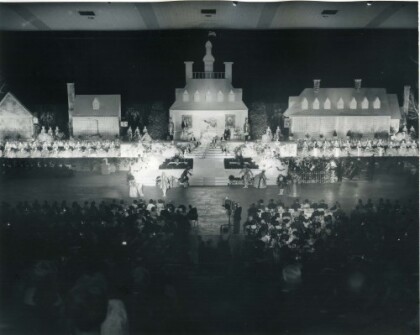

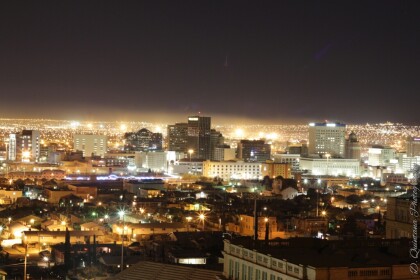

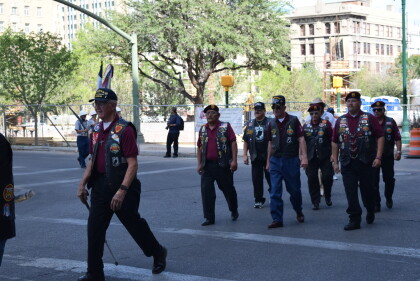
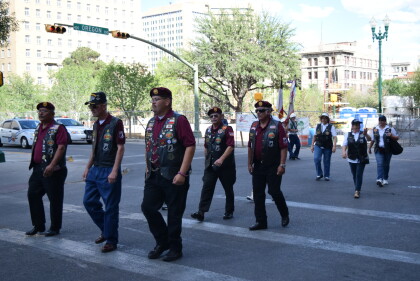
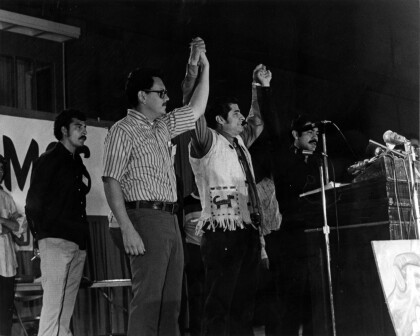
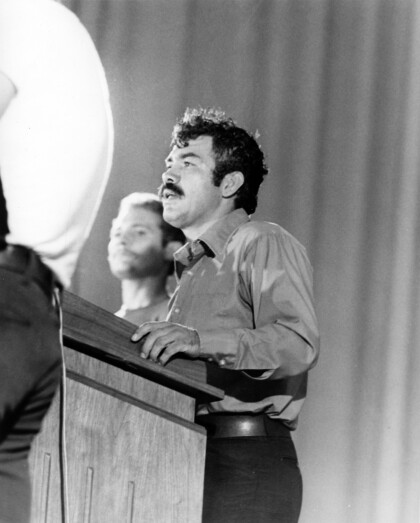
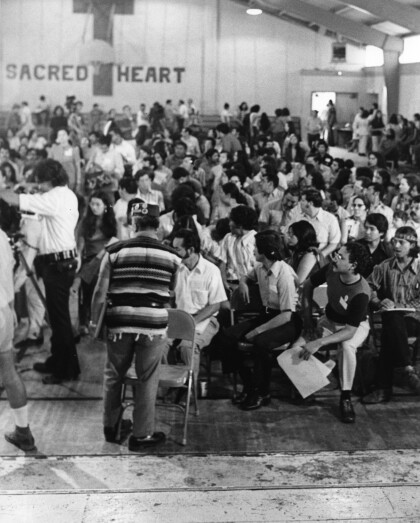
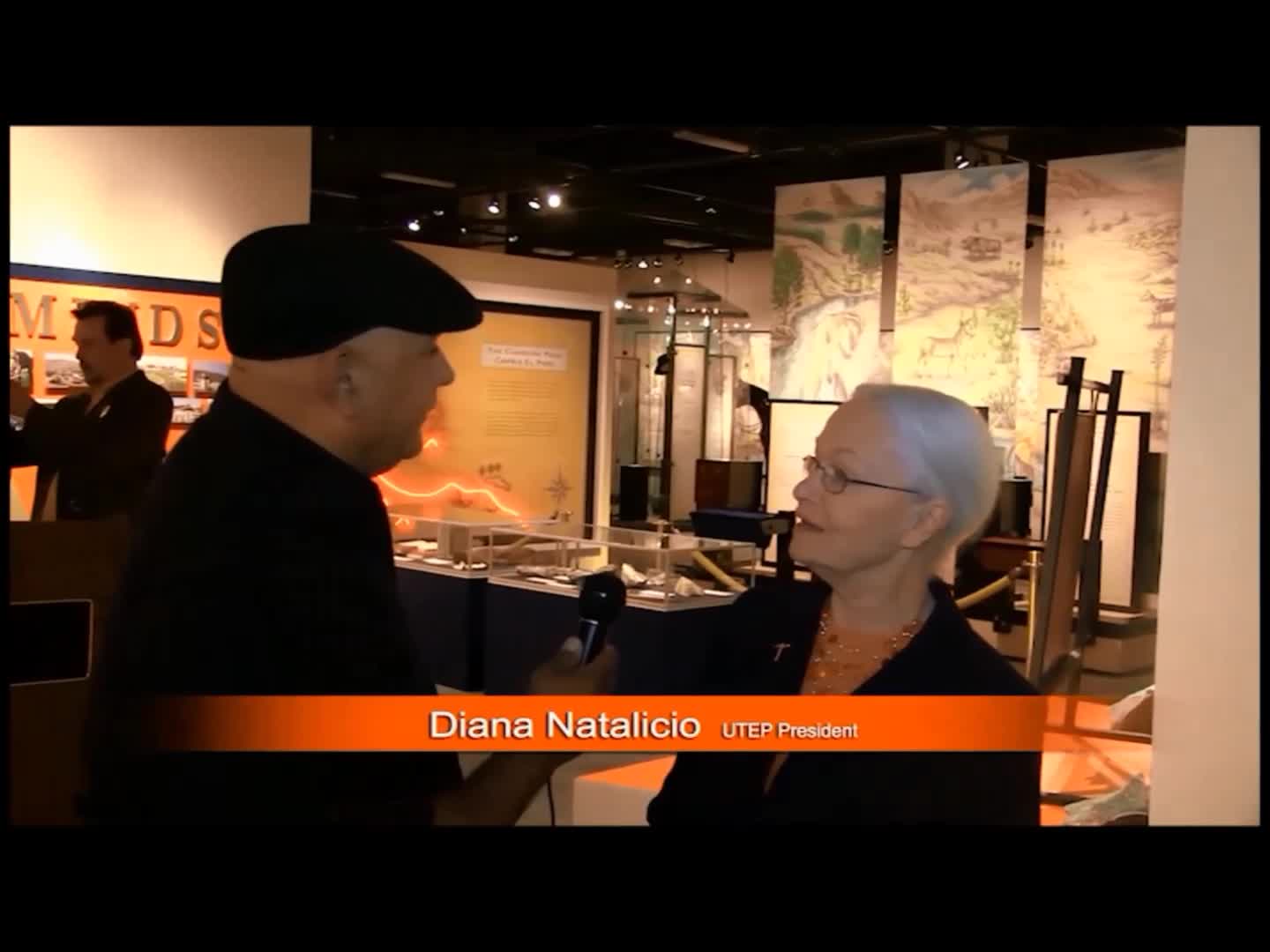



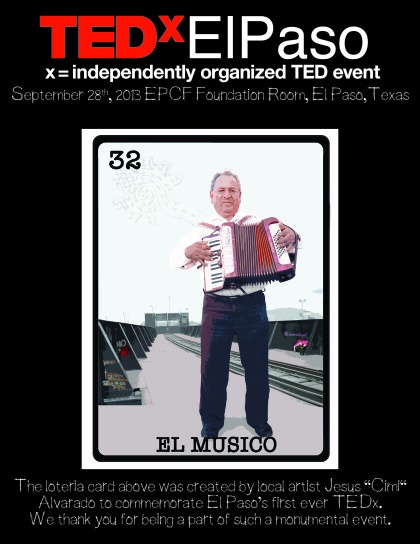
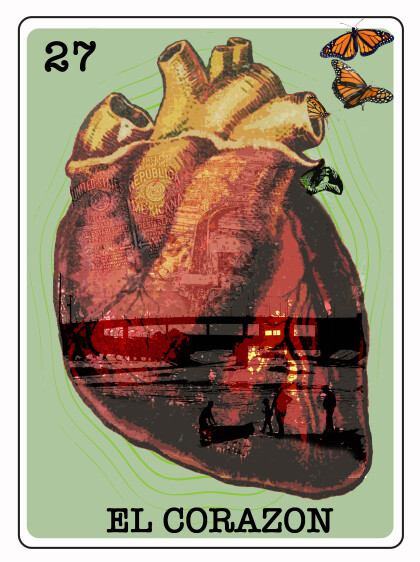

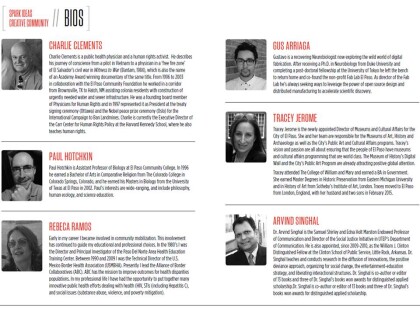
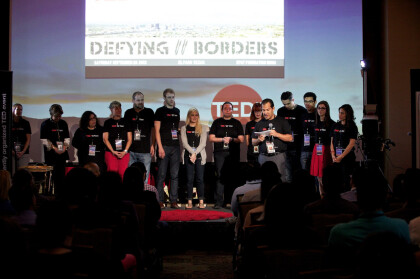

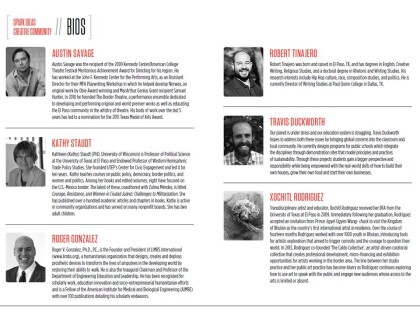

Comments
Add a comment